Down Mexico way
Risks and rewards of Mexican moving

Boxing clever
Top that FIDI FAIM audit superstars


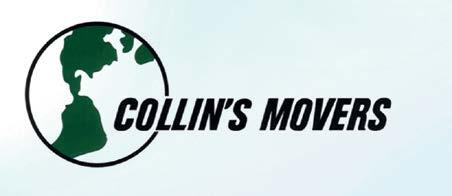






























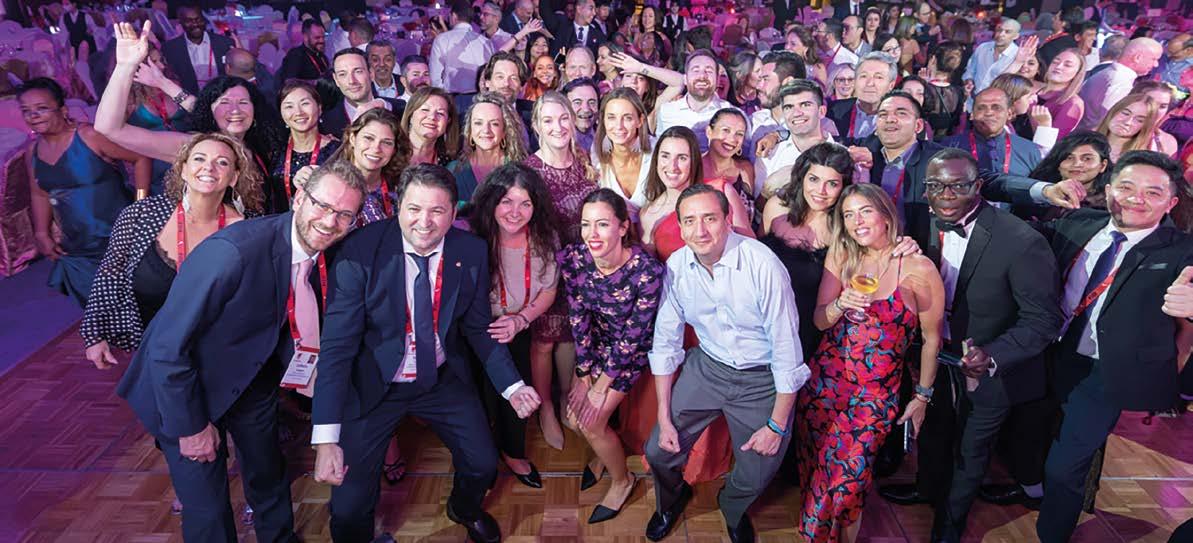
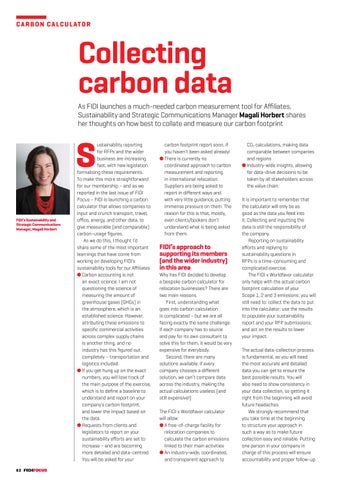
Down Mexico way
Risks and rewards of Mexican moving

Boxing clever
Top that FIDI FAIM audit superstars


































We all know that, in business and the wider world, embracing virtual communications and the technological revolution is a good thing – right? Well, two students in my son’s school were caught out when they embraced tech a little too zealously in their work recently, leading to them being accused of using ChatGPT to complete their assignments, not only as a research tool, but cutting and pasting answers directly into their projects. Both got away with a warning, and told they must complete their work themselves – or suffer the consequences.
It got me thinking about the limits we set for technological advances in the moving industry. It’s an interesting and challenging exercise to find where the boundaries should now lie, and to define what we can realistically and productively let the computers and algorithms do, and what must remain in the hands of humans.
There is no question that technology will change – is changing – the global mobility business for the better, and that firms that use it well will be those that survive and thrive. At the same time, however, we all know moves are still one of the most personal services a company can deliver for a customer. So, while tech can support movers and DSP companies by carrying out routine tasks, including administration, data analysis, and basic legal and financial duties – even, potentially, automated transport and delivery – there are some things we really shouldn’t be digitalising.
When it comes to advanced customer service –in the many, many situations where you want to go the extra mile, or that demand more than just a chatbot – and tasks that involve qualities such as creativity, critical thinking or emotional intelligence, we instinctively know they are best left to people rather than computer processors.
With the FIDI Conference upon us, it’s also a good time to reflect on the huge benefits of getting together in person, compared with the tech-based ‘alternatives’ that we became familiar with during
FIDI President Derek Duffy on the limits for technology and why meeting face to face is so important for the moving business
the pandemic. When lockdowns happened, the FIDI Academy swiftly and successfully pivoted to make its EiM and MiM2 seminars available online. When international restrictions were lifted and we were able to bring back in-person seminars, demand for the virtual sessions was quickly replaced.
As the Bangkok EiM, the first FIDI DSP seminar in Milan, and the Swiss LiM prove, our industry still places incredibly high value on opportunities to meet face to face and build relationships together, despite the range of online training options available.
The FIDI Conference is one such opportunity – and a major one. Coming together for these four days of panel sessions, seminars, networking and social activities gives us so much more than online interactions. It allows us to move projects forward much quicker, get and action feedback from supply chain partners, clarify grey areas, judge people’s reactions (which is so difficult from behind a screen), and build trust. It’s so much more satisfying – and so much more is possible – when you can shake a hand, laugh with someone, share confidences, socialise, and build connections with people that often stretch beyond the business.
The FIDI Conference also has something that no Teams call could ever provide: an atmosphere. This will, of course, be provided by the FIDI team and Affiliates coming from every corner of the world, but, as always, our choice of location will help, too. Edinburgh – in the heart of Scotland, surrounded by rugged landscape and sea, with cobbled streets, cosy pubs and restaurants, and many historic buildings –offers us atmosphere by the spadeful.
I attended my first FIDI Conference in 1997 in the Dutch seaside town Noordwijk aan Zee. The warmth and kindness with which I was welcomed to our industry is still offered in abundance at every FIDI Conference, first-timer or not. I’m afraid that technology and artificial intelligence are just going to have to work a little bit harder to figure this one out.
I am really looking forward to seeing you there and soaking it all up with you – in person.


10-16 NEWS
Including: MOBILITAS acquires Santa Fe; RMC Paragon goes bankrupt; Suddath returns to Atlas; Shyft ceases trading; HomeSafe improves GHC terms
SPECIAL FEATURES
18-20 YANN BLANDY
The outgoing Santa Fe CEO discusses his lessons learned
34-40 INSURANCE
Andrew Bennett on the forces behind the rise in premiums
52-53 WORLD BANK
Ignacio Alcalde and Peter Bowsher, outgoing and incoming heads of mobility at WBG
56-58 REUSABLE BOXES
Sustainability champions and their reusable box initiatives
74-75 LAURA GANON
FINK Mobility’s CEO on the company’s centenary journey
REGIONAL FEATURES
26-33 MEXICO
Geography and crime have challenged, but not stopped, a boom in Mexico’s moving industry
FIDI BUSINESS
42-43 FIDI ITALY
Max Ajroldi, President of FIDI Italy and ANIT, on reducing admin for the Association’s membership
44-48 2024 FIDI CONFERENCE
A preview of the Conference programme
50 FIDI FASI
A need-to-know guide to recent updates to FASI’s operating rules
54-55 FIDI NETTING
With FIDI’s international netting project ready to go, a reminder of the benefits it will bring to Affiliates

62-63 FIDI C0 2 CALCULATOR
How to make collecting and measuring carbon data simpler
64-65 TOP PERFORMERS
Shola Gallard explains what it takes to join FIDI’s top-flight Affiliates
68-69 FIDI 39 CLUB
Board member Sonja Tuomela on the club’s evolution
70-71 PCG GUIDANCE
Nick Kerr looks at new PCG advice on the issue of abandoned cargo
72-73 FIDI ACADEMY
A review of FIDI Academy’s first DSP seminar, held in Milan
REGULARS
24 AT A GLANCE
Statistics on Mexican moving
78 PEOPLE MOVES
Including: FM Alliance; Stouffer promotion at JK
80 OBITUARIES
Dave Graebel, Gethin Dalton, Harm Meierdirks
82 LIGHTER SIDE
Including: Brytor International 60; PMR charity activities









FIDI President Derek Duffy on why there is no beating meeting face to face Page 5
FIDI Secretary Jesse van Sas reflects on the implications of the loss of an industry RMC Page 23
Moving companies need a clear, collaborative reuse strategy, says Paul Barnes, from Inspire Mobility Consulting Page 46
FIDI 39 Club President Jackie Stouffer on the development and networking opportunities that 2024 will offer Page 60
Paul Baker, of Baker & Co, looks at current strains facing the industry –and offers advice for a successful year Page 76

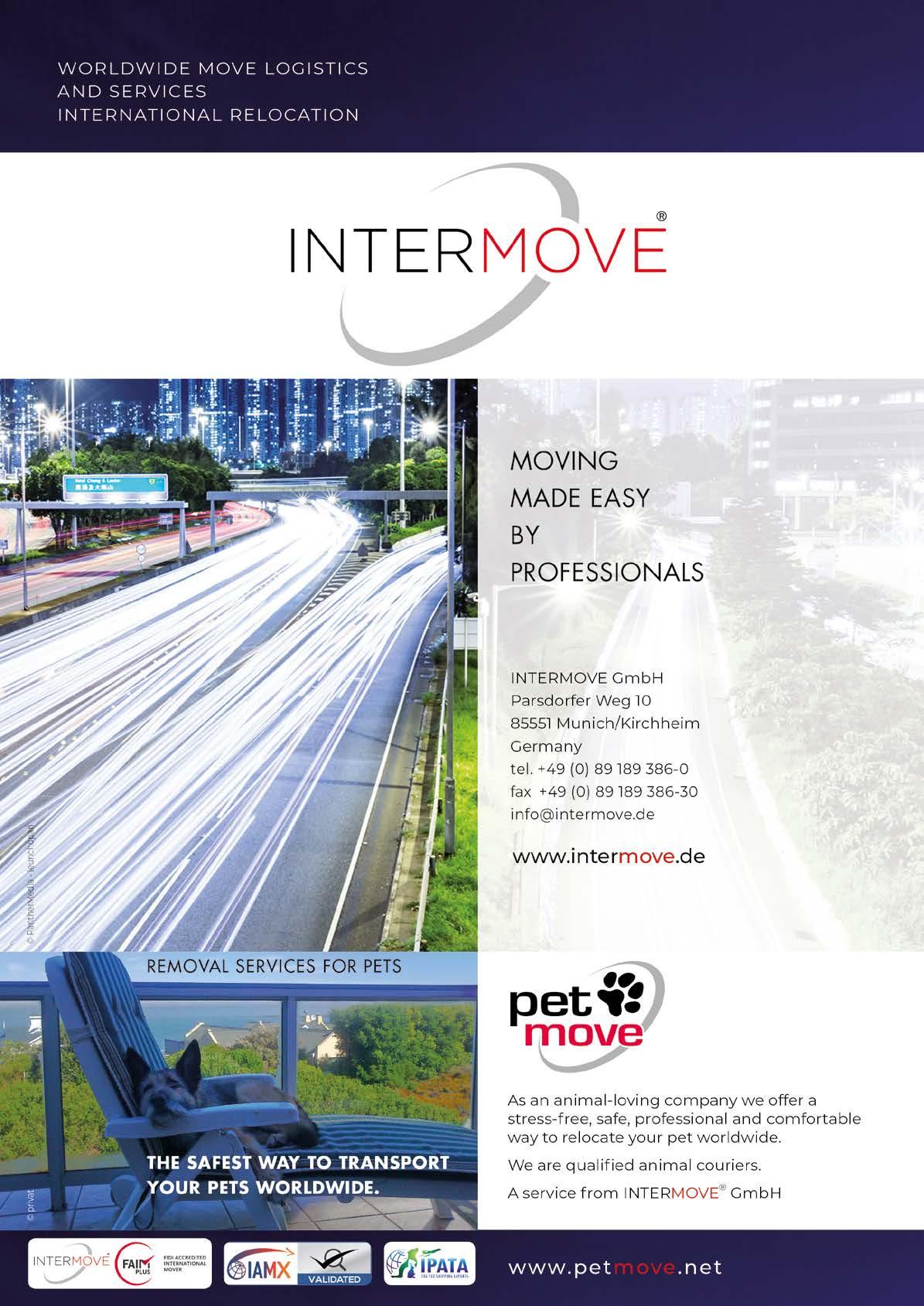

If you thought last year was busy in terms of industry upheaval, 2024 will be busier still if January and February are anything to go by.
In 2023, mergers and acquisitions returned to the agenda in a big way postpandemic, with a flurry of company purchases and consolidations; maritime challenges were rarely out of the news; and an increasing number of cybersecurity incidents affected moving and logistics sectors.
This year began with what appears to be an even more notable collection of events, including the sale of Santa Fe and Sanelo to MOBILITAS, the demise of Paragon – a smaller, but still significant, RMC business – and the liquidation of online moving marketplace Shyft Moving. Each of these pieces of news tells a story about the powers currently shaping the global mobility industry.
The Santa Fe deal comes on the back of four years of turmoil – from COVID to subsequent supply chain issues – with the outgoing owners suggesting that, in this industry of slim margins, long-standing familyowned businesses are perhaps better equipped to ride waves of market turbulence. Paragon was impacted by the same forces, but could its failure be indicative
of a growing fragility in the RMC business model? This is certainly one to watch in the coming months.
The Shyft closure shows that other business models are apparently under threat, too. New investors and US$16m of funding were secured, and a new CEO put in place just a few months ago, but the company still collapsed. So, was it just another victim of the unprecedented pressures in the market? Was the company set up wrong? Or is the world simply not ready for an online moving marketplace?
A moving industry novice just five years ago, outgoing Santa Fe investor Yann Blandy has some opinions on what has driven these recent challenges. He believes the financial stability and long-term perspective of traditional family businesses are a great asset in today’s unsteady market. Read more about this in our ‘exit’ interview with Blandy on pages 18-20, and in this year’s FIDI Focus State of the Industry report, due for publication in March.
There is clearly a lot to discuss at the 2024 FIDI Conference in Edinburgh. I’m really looking forward to seeing you there. To arrange a meeting, please contact me by email or via the Conference app.
DOMINIC WEAVER Editor, FIDI Focus
In a significant move for the international moving and relocation industry, the MOBILITAS Group has acquired Santa Fe Holdings Limited, the parent company of Santa Fe Relocation and Sanelo.
The MOBILITAS Group – a French familyowned conglomerate specialising in global removal and relocation services, alongside physical and digital records management –aims to bolster its market position through this acquisition. Santa Fe Holdings Limited is known for its global mobility
expertise and diverse customer base.
Cédric Castro, pictured right, CEO of the MOBILITAS Group, said he was excited about the integration and highlighted the group’s proficiency in nurturing multiple brands to independently grow in their market segments. He said Samuel Mergui would assume the role of CEO of Santa Fe Holding Limited.
Yann Blandy, former Executive Chairman of Santa Fe and Sanelo, said: ‘This is the best possible outcome for Santa Fe, Sanelo, our colleagues, clients, and
Suddath Moving & Storage, a subsidiary of The Suddath Companies, has announced it is rejoining the Atlas Agent network after parting ways with UniGroup.
The business – which was an Atlas Agent and shareholder from 1950 to 1981 – made the announcement in a joint statement with Atlas Van Lines.
The statement said: ‘Suddath’s return to the Atlas Agent family was a logical decision for both organisations given their symmetry and shared goals. Atlas and Suddath are aligned on culture, branding, values, corporate responsibility, and environmental, social, and governance in support of a more diverse, inclusive workplace.’
Mike Brannigan, President and CEO of The Suddath Companies, said: ‘Household goods continues to be a critical part of Suddath’s core business, and partnering with Atlas will help us accelerate our growth strategy, especially in the corporate, B2C, and military relocation segments.
‘We are excited to pair Suddath with a van line that brings capability, quality, and flexibility to its Agent-centric business model. We have long admired that Atlas actively seeks Agent engagement and input, from processes to technology, to ensure there is alignment across the enterprise supporting and maintaining its core vision and culture. We look forward to a successful, long-term partnership with Atlas.’

partners.’ His optimism reflects a confident outlook for Santa Fe and Sanelo’s future growth within the MOBILITAS Group’s portfolio.
This acquisition signifies MOBILITAS’s ambition to
expand its leadership in the global mobility sector, promising innovative and efficient solutions for customers worldwide.
See interview with Yann Blandy on pages 18-20
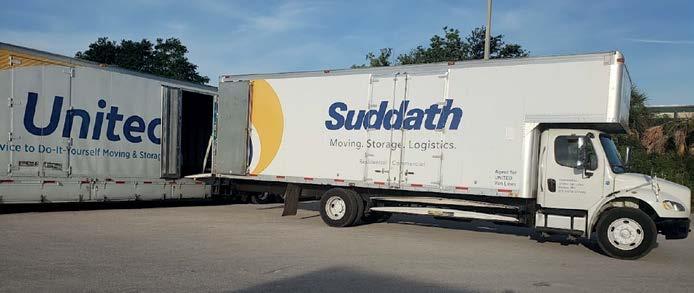
Jack Griffin, Chairman and CEO of Atlas World Group, said: ‘Suddath coming home to Atlas brings two highly regarded brands back together in the moving industry and further positions Atlas as an industry-leading van line. Atlas offers Suddath flexibility and stability, while Suddath brings vast capabilities that directly align with Atlas’ daily operations and long-term vision. We are pleased to welcome Suddath back home and into our Agent family and remain committed to the highest level of success for our agents, professional van operators, customers, and employees.’
Meanwhile, a UniGroup Board of Directors letter to shareholders and agency owners said The Suddath Companies had announced its intention to depart UniGroup on February 4. It said this was a ‘violation of its agency
agreement and commitment to remain a member until December 31, 2024’.
The letter said UniGroup had therefore terminated Suddath’s agency agreements and was carrying out its termination response plan while ‘pursuing all rights and remedies available to our network’.
While this transition would be ‘administratively burdensome in the short term, we are well positioned to respond and confident in our plans for the future’, it said, adding that the departure gave ‘immediate opportunities for growth and collaboration among current members of our cooperative, especially when it comes to residential, national account and RMC business’.
UniGroup said it was notifying all affected customers, adding it was committed to honouring existing contracts with United Van Lines and Mayflower Transit.


New Delhi-based Agarwal Packers and Movers Ltd (APML) has bought 108 new Eicher Pro 2059 XP smart vehicles from VE Commercial Vehicles Ltd (VECV), the first batch of 540 vehicles it plans to purchase from the company in 2024.
The company made the announcement at the Shri Ram Pratisthapan Ceremony in Ayodhya. APML’s Ramesh Agarwal said: ‘The Ram Pratisthapan Ceremony is a symbol of new beginnings, and our investment in cutting-edge technology echoes our commitment to evolving with the times while staying true to our core values.’
DP World Marine Services says it has reduced its carbon footprint by more than 16 per cent last year. The company says much of the reduction came from efficiencies including optimising vessel routes, scheduling to optimise usage and reduce idling time, and improving its deployment networks with more direct, shorter routes.
FIDI Focus has launched a new set of technology-focused guidelines for Affiliates.
Digitalisation for moving and relocations business: Guidelines for getting started provides advice for small and medium-sized companies that are in the early stages of their digitalisation journey, to help them develop a coherent strategy for developing this side of their businesses. It includes a list of simple changes movers can implement to drive efficiencies, and pragmatic risk management advice that companies can use to protect themselves against the possibility of online crime.
FIDI Focus editor Dominic Weaver said: ‘With digital readiness already a part of the FAIM standard and set to become mandatory in the next version to be released in 2026, it’s essential that movers accept digitalisation as central to the quality of their operations. Recent and more frequent cyber-attacks on the industry have made the issue of digital security even more pressing. These guidelines are there to help businesses define straightforward steps for the technological transformation of their operations.’ The guidelines are available here: https://www.fidi.org/2023fidi-focus-technology-guidelines
Online moving marketplace Shyft has closed its doors and entered insolvency.
In June of last year, and following a second round of financing for the techbased venture, Shyft announced that its founder, Alex Alpert, had left the business, with the company’s Senior Vice-President of corporate development, Bill Brill, and Chief Marketing Officer, Dave Austin, becoming interim co-presidents. The company appointed tech industry veteran Randal Meske as its CEO in September.
According to the IAM, the technology company announced a large reduction in the workforce at its Belgrade offices at the end of November and began insolvency proceedings on December 5.
Bill Brill joined full-service household goods mover MiniMoves Inc as Senior Vice President of its new international-focused division in early December.
IAM advised members that compensation claims for unpaid invoices against Shyft need to be submitted before April 9, 2024.

The US Senate has unanimously approved new legislation requiring US Customs and Border Protection (CBP) to remove sensitive Personally Identifiable Information (PII) from the manifests for incoming shipments before they are sold to commercial interests.
IAM said in an announcement that this was a ‘critical initiative’ that would ‘help secure personal information for service members, their families, and all private, not-for-resale household goods shipments entering the country’.
PII can include passport details, home addresses and social security numbers, and are sometimes included in the commercial side of shipping manifest datasets, exposing them to the risk of misuse.
IAM has supported this legislation through several Congressional sessions;

earlier versions of the bill had progressed but were ultimately not adopted.
Once the law is passed, CBP has 30 days to make the changes necessary to protect the sensitive information.
International moving and storage solutions marketplace CEND has merged with online moving rates generator PricePoint.
An announcement by the companies said the move would increase service breadth and sustainability, while adding a wider network of partners and increasing capacity.
Ben Heller, CEO and Chief Customer Officer at PricePoint, said: ‘…our combined company will be able to provide customers with better solutions that meet the changing requirements of talent mobility and transferees.
‘From our perspective, HR strategies are changing, with moving benefits transitioning from being managed by HR to being managed by employees. Moving needs to be part of the workforce mobility ecosystem – while meeting the needs of the individual.
‘Solving all these challenges requires a multidimensional moving solution, with a global supply chain across different methodologies and service levels from white glove to DIY. With CEND joining forces with PricePoint, we will have the team and tools to serve every transferee, on every move, anywhere in the world.’
Welsh logistics provider Owens Group has been hit by a cyberattack, resulting in its internal data being published on the dark web, according to reports.
The attack was said to be the latest to use Lockbit ransomware, where demands for money are made to businesses to stop their information being released if the ransom is not paid.
According to a report in TheLoadster, the Owens data includes financial information, including budgets, cash flow, balance sheets, tax returns, project calculations and bank statements; client details such as addresses, phone numbers, payment information and contracts; and employees’ personal information including passport scans and contracts.
Earlier in November, global ports operator DP World was affected by a major cyber attack that brought its operations in Australian ports to a temporary standstill. It was the second large-scale cyber attack on ports this year, with Nagoya, Japan, hit in July.
FIDIFocusrecently published technology guidelines, which include recommended cybersecurity precautions for movers.

Supply chain visibility and collaboration platform Beacon’s Port Congestion Review showed that container dwell times improved at 71 per cent of ports between January and December 2023. The improvement was particularly strong in South East Asia, according to the report, while US ports ‘struggled’.

Dubai Arabian Shipping Agency (DASA), headed by Craig Reilly, has become the third OMNI member in the UAE. Although it’s a small country, it is home to many hundreds of moving companies. Craig said that OMNI membership will help DASA raise itself above the crowd. ‘This sets us apart from much of our competition. We feel that OMNI membership fits the direction our company is taking.’
China State Shipbuilding Corporation (CSSC) has released its plans for a large nuclear-powered container vessel. The ship will be 24,000-TEUclass and is designed to achieve zero emissions during its operating cycle, according to the company.
COSCO Heavy Industry Shanghai Co. has contracted with MAN Energy Solutions for the retrofit of four COSCO Line containerships to dual-fuel methanol engines. The retrofitting of the first vessel is scheduled for Q2 2025.
US RMC Paragon Relocation has filed for bankruptcy, leaving sizeable debts to movers and DSPs around the world.
The Lewisville, Texas-based business filed a court petition in the Eastern District court of Texas on January 31.
There are a total of 77 non-priority
creditors, including some FIDI Affiliates, and accounting for unpaid debts of approximately US$11.6 million.
Paragon was founded in 1991, offering a full range of mobility services for the US domestic and international market.

A spokesperson for Yemen’s Houthi rebels has said the group will restrict its attacks on shipping to its aims of blockading Israel and retaliating against air strikes by the US and UK, and does not intend to expand action beyond the Red Sea and immediate surroundings.
The Houthis have targeted Israeli ships at the mouth of the Red Sea in solidarity with the Palestinians since October, when Israel began military action in Gaza, following Hamas attacks on October 7.
In an interview with Reuters, Mohammed Abdulsalam said the group had no plans to target adversaries Saudi Arabia and the United Arab Emirates.‘We do not want the escalation to expand,’ he said. ‘We imposed rules of engagement in which not a single drop of blood was shed or major material losses. It represented pressure on Israel only, it did not represent pressure on any country in the world.’
The attacks have forced international shippers to reroute trade between Europe and Asia around Africa, adding costs and doubling the time taken in some cases. ‘We do not want the conflict to expand in the region… and we are still working on non-escalation, but the decision is up to the Americans, as long as they continue to attack,’ said
Abdulsalam. ‘Yemen is concerned with responding, and is interested in verifying or maintaining its position by preventing Israeli ships from heading to the occupied Palestinian territories.’
According to shipping trade union Nautilus International, the UK warlike operations area committee (WOAC) has expanded recommendations to allow shipping staff on vessels with ties to the UK and US to disembark at a port before entering a high-risk zone or to receive twice their usual pay for each day spent in the affected zone. This recommendation was previously only for Israeli-linked vessels.
As FIDI Focus went to press, three crew members on cargo ship True Confidence had been killed by a Houthi missile attack, the first deaths caused by the attacks. Another ship, the Rubymar, which was carrying fertilisers, sank two weeks after a strike.



Your One Stop Shop Partner for
Moving & Relocation Services
USTRANSCOM has announced a modification in the Global Household Goods Contract (GHC) for US military moves awarded to HomeSafe Alliance.
In a statement on LinkedIn on 14 February, the organisation, which oversees the GHC, said it was adding US$60m to the value of the contract and an additional 12 months of transition from its current Defense Personal Property Program (DP3) to the GHC. The extended timetable runs until 11 February 2025. The total value of the contract across its maximum term was previously quoted as US$6.2bn.
The change follows speculation about the deliverability of the GHC, which was initially tendered before the COVID-19 pandemic and ensuing rises in energy, shipping, and other supply chain costs that have significantly impacted on suppliers, and other issues.
According to FEDEMAC, HomeSafe has experienced ‘challenges in integrating systems with the government’ and faced a backlash from moving companies that provide military moving services.
Speaking to FIDI Focus before the February announcement,

the IAM’s Director of Government & Military Relations, Daniel J Bradley, said, because of the setbacks, he believed USTRANSCOM had changed its strategy from a date-specific rollout to a conditions-based rollout.
‘It appears, at this point, the initial delays have been related to both TRANSCOM and HomeSafe IT solutions,’ he said. ‘Once these systems have met whatever requirements have been set by TRANSCOM, then an initial, fairly small rollout of local, US shipments
HomeSafe announced a change of management in December 2023, with Bobby Nicholson taking over as CEO from the start of 2024. The company said this was part of a ‘planned transition of leadership’ as the programme moved from the technological implementation to operational stage.
Nicholson has 16 years’ experience at HomeSafe’s parent company, KBR, where ‘he has demonstrated his ability to effectively helm customer-focused logistical programmes with significant impact on the men and women of our military across the globe’. Prior to that, he held leadership positions in the US Army.
will begin at a small number of locations.’
Bradley added that there was potential for a ‘small number of shipments’ to begin during the spring. The initial contract award would have seen all US domestic shipments under the GHC by summer peak season this year, with some international shipments starting in the autumn. ‘That certainly won’t happen now,’ he said.
With the US military the single largest mover of used household goods in the world, many movers in the country had been founded – financially and geographically – on this business. ‘These companies will need to decide whether they’ll continue to service military shipments,’ Bradley said.
‘Based on what we hear from a number of our members, adjustments would seem to be needed for some of the current participants in DP3 to sign on as service providers to GHC.’
He added that primary concerns were ‘over the rates that will be paid under the contract’.
While USTRANSCOM and HomeSafe are ‘completely committed to delivering the contract’, said Bradley, ‘whether they can create a network to move up to 300,000-plus shipments of household goods every year is something that our members have voiced their uncertainty over’. He added that he didn’t know who had signed on to the programme so far.
‘Getting the GHC right is important for the US service member,’ said Bradley. ‘As it starts to roll out, it’s important that the moving industry and USTRANSCOM ensure the best product for the customer, which needs the best moving companies who understand the DoD [Department of Defense] process to participate.
‘To make it attractive to those companies, they have to understand and agree to the contract parameters and believe that the GHC is good for their business. Beyond some of the system struggles we’ve heard about, this seems to be the biggest challenge facing a full rollout.’




The sale of Santa Fe and Sanelo to MOBILITAS means outspoken investor Yann Blandy exits the moving industry after four and a half years leading a revival of the businesses. FIDI Focus Editor Dominic Weaver spoke to him about why the deal will ensure the longevity of the Santa Fe brand and what he has learned from his experience in the sector

The sale of Santa Fe and Sanelo to French family-owned business MOBILITAS, announced on 6 February, marks the end of a four-anda-half year journey for Yann Blandy, one of the founding partners of Lazarus Equity Partners, who, with the backing of Proventus Capital Partners – and in partnership with Runar Nilsen – bought the struggling firms in September 2019.
In the relatively short time he has been in the moving industry, Blandy has gained a reputation for his straight-talking, sometimes challenging approach, and use of swearing during conference appearances and in interviews (FIDI Focus has edited this out –which, Blandy jokes, will have people wondering if this interview is authentic).
For Blandy and his investment team, the moving sector wasn’t a hard target. They had entered Santa Fe a few months earlier as consultants for a bank – ‘one assignment among others’ – with a brief to help work out why the business was failing. The project gave them an understanding of the fundamental changes required to its model and, when the opportunity arose, the confidence to take on the challenge of implementing them.
At the time, Blandy said that while Santa Fe had been operating in a difficult and slow-growing market, most of its issues were of its own making. ‘I’d say 80 per cent of the problems in Santa Fe were created by Santa Fe. We carry the weight of our own mistakes to a large extent,’ he said, citing sizeable missteps, including the manner in which it had entered the US market, tried to sell its immigration business to CIBT at the start of 2019, and, in particular, the way it was managing its people and clients.
‘We saw in Santa Fe two hidden assets that were completely mismanaged: its people and its client base,’ says Blandy, ‘We figured out that we needed to unlock the potential of these two things in the business. It was all about the brand.’
The onset of the COVID pandemic just a few months after the purchase disrupted the timing and format of Blandy’s original turnaround plans. Together with his management team, however, he set about repairing relationships with Santa Fe’s previously dissatisfied customers, and building new ones.
‘We worked on reaching out, talking to people, not shying away when we were chased by anyone for poor quality or not paying, for example,’ says Blandy.
‘We made sure we went out there and the brand was visible, and we said what we thought, and did what we said. Being extremely consistent was key to rebuilding trust in the brand.’
One of Blandy’s proudest milestone moments in this process – which those who attended the FIDI Conference in Cannes may remember – was the succession of Santa Fe staff declaring their presence at roll call. ‘I thought to myself, “Yeah, we’re back”,’ he says.
Key achievements during Lazarus’s time at the helm of Santa Fe include fixing the US strategy, which, says Blandy, ‘was completely out of whack’, and he defines the distance the company has come in two numbers. ‘In 2019, when we joined, the retention rate for clients at Santa Fe was 87 per cent – which is a disaster. It means you have lost 13 per cent of your clients every year before you’ve even started. Last year, this was 99 per cent.
‘This, fundamentally, is the result of the way we operate, the way we serve our customers, the quality focus, the retention focus, the way we put out our teams together – all this work to actually do it right.’
The second metric, Blandy says, is that Santa Fe’s revenues from agents and partners across the industry have leapt to two and a half times what they were in 2019 – to around ¤18m last year. ‘This means we were able to rebuild trust and relationships with players in the industry who would have completely discounted us because of the strategy we had before.’
These two figures also show that the company is back on track with its staff, he adds: ‘We did something right for our customers, which means we have done something right for our people – because we wouldn’t have been able to do this for our customers without doing something for our people.’
Given these positives, the sale of the Santa Fe and Sanelo to MOBILITAS came as a surprise to many. However, Blandy says the deal has arisen at the right time for the company.
‘When we joined the industry, everyone was speculating that we’re not the profile of investors that are going to be here for the long term, and that’s absolutely true,’ says Blandy. ‘Because we are who we are, there would always have been some form of an exit – and, if not now, it would have happened later.’
Most importantly, he adds, ‘as owners, we have taken Santa Fe as far as we could’. The sale to

MOBILITAS – the product of conversations with Group Chairman Alain Taïeb and CEO Cédric Castro, who, Blandy says, are ‘great professionals’ - brings Santa Fe the essentials it has been missing to reach its full potential. ‘If you take a step back and really look at what makes a business successful in this industry, these things immediately jump to mind,’ says Blandy. ‘Most are family or privately owned, rather than being owned by financiers like us. This gives them a perspective that lasts for decades and generations, rather than a short-term view over the next month, quarter or year.’
He adds that the equity ownership, stock-listed model may be the reason businesses such as SIRVA BGRS or Cartus have experienced difficulties. ‘Going forward, some of these will have to figure out if this is ideal for this type of industry, which has wafer-thin margins and a very, very challenged cash profile,’ says Blandy. ‘This isn’t great for financiers or the stock market, which both look for fast returns.
‘Successful businesses in this industry are financially solid; they can invest in their future, whether that be in their people, geographic expansion, technology, diversification – you name it. They’re not saddled with debt.
‘Most are also diversified - in records management, logistics, office moving, last-mile delivery, and so on – and are not 100 per cent focused on relocation; and they have a solid technological foundation that they have developed in-house, rather than relying on external technology.’
On every one of these elements, Blandy says, ‘Santa Fe was on the wrong side, because of past management mistakes’. When it came to developing the business and coping with two years of COVID – and the ensuing freight challenges, energy and general price inflation, recession, war, and other difficulties –the company was ill-equipped.
‘Santa Fe was dancing on one leg, which was global household removals,’ says Blandy. ‘But movers need to diversify and take on technological development, account for macroeconomic changes and fundamental changes in the way we work, to ensure they have a sustainable business going forward.’
Santa Fe’s accumulated ‘legacy’ makes it incredibly hard to fix the issues still at hand within the company, says Blandy. ‘If Santa Fe and Sanelo are to regain their greatness, they need to find a home, which is on the right side of the above elements – and MOBILITAS gives them that.’
He feels three emotions about completing his journey with Santa Fe: relief, pride, and sadness.
‘Finding MOBILITAS as a new home for Santa Fe is a great relief, because I know the company is going to be able to thrive again,’ Blandy says. ‘MOBILITAS has acquired a business that is going to make it even more of an industry leader than it already is, giving it synergies and a fantastic brand to capitalise on, with different strengths from the other brands already in its portfolio.’
With MOBILITAS’s ‘buy don’t sell’ strategy,

Blandy says this is a home for the long term, too, ‘not just for the next three to five years. And this means my colleagues at Santa Fe and Sanelo have found a place.’
His sense of pride comes from the fact that ‘there wasn’t anything to sell five years ago’, while his sadness comes from leaving behind the many colleagues he has worked with and friends he has made in the moving industry.
‘You don’t lead a company like Santa Fe without being fully engaged, personally and professionally, with all those individuals you meet within and outside of the business,’ Blandy says.
Indeed, it’s these people that have made the Lazarus team’s experience in the industry very different from what they were expecting.
‘In the beginning, people told us it’s very much a relationship business, and we thought that’s like any industry: it’s not,’ he says. ‘This is the element that surprised us most, but once we understood
it and embraced it, and we started to build those relationships, it really helped us.’
This people focus, and the true nature of moving, was an element his management predecessors didn’t understand, he adds. ‘They thought this was just a logistics business – and, yes, we put stuff in containers – but, on the operations side, it’s anything but. It’s all about the way you sell, the way you talk about it, market it, and the relationships.’
Having a ‘relentless people focus’ is behind the company’s biggest successes, Blandy says, citing people from across the firm’s portfolio who have made a difference, including Christine Sperr, Srinivasan Narayanaswami, and Morgan Beaumont, responsible respectively for turnarounds and business growth in the company’s Dubai, India, and BeNeLux offices. Ultimately, he says, leadership is about getting out of your staff’s way, giving them the tools they need, and ‘recognising that they are professionals and they know what they are doing’.
‘I define being CEO as “three plus one”,’ says Blandy. ‘Number one is making sure you have the right people in the right place. Number two is making sure that, together with these people, you’re clear as to where you’re going and why. And number three is “just do it”.’
The ‘plus one’, he adds, is about remembering that 90 per cent of your job is communication. ‘This is about who you talk to and when, how you talk, how you dress, your body language.’
Looking back at his experiences over the past four and a half years, Blandy says he would do two things differently. First, he would change the timing – ‘coming in just before COVID was about the most messed-up timing we could have had. I would have changed this if I possibly could.
‘Second, I wouldn’t have fallen for Santa Fe and Sanelo with such a crush as I have, as it makes it very difficult to leave now.
‘Financiers are supposed to be very rational, but you cannot enter this business without bringing your whole self to work, and there are a lot of emotions and relationships involved. But if you want to lead a company and make the industry connections you need, it’s about more than rationality.’
In January 2023, Blandy passed the Santa Fe CEO reins to Runar Nilsen, who remains at the helm of the company, and reduced his workload to concentrate on other projects in the Lazarus portfolio, which over the past five years has grown by another seven businesses. All of these are outside of mobility, but, he says, they will benefit from his learnings about the immense power of people in a business.
Blandy exits the company entirely to focus on helping Lazarus move towards its ambitious goal of growing to a revenue base of a billion euros - although he will be taking a short break first.
Will he miss the moving business? ‘Of course,’ he says, adding that he will keep in touch with many of those he has met along the way. ‘I will miss the people there. It’s a very special industry.’

MWith internationally dispersed teams and continual change major factors in global mobility, building a cohesive company culture can be a challenge. Sterling Lexicon’s Kristin White outlines the steps companies can take to keep their brand values strong, bringing benefits to staff, customers and their business
ultiple studies show the advantages of diverse teams working together around a common culture –boosting creativity, innovation and retention, and making engagement stronger. But what happens when company culture isn’t well defined?
With rapid change and fully remote and hybrid workforces presenting new challenges to fostering strong company culture – with mergers, acquisitions, and expansion into new territories often creating further complexity –it’s a good time to ask that question.
Culture is fundamental to what makes a company different; its DNA. For a global organisation to be truly united, its people, services, messaging and brand must all align with, and reinforce, the same values, purpose and mission. Here, Sterling Lexicon provides some learnings from its recent brand refresh.
FIDI Focus (FF): How does a business embrace change while preserving culture?
Kristin White (KW): The most important thing is to stay focused on your purpose, because this doesn’t change. Holding true to why you do what you do is essential for maintaining a strong culture and brand. When you work to keep the focus here, your core messages and, more importantly, your actions reinforce that purpose. When teams align around purpose, there are internal benefits – and customers experience more consistent service delivery.
In our case, we knew that our ‘why’ was to help people move and settle into new roles happily, safely and compliantly. But we also recognised that the world of talent mobility was changing as fast as the world of work. We had to do a better job of telling the story behind the people who fulfill our purpose, including their passion and tenure, and the
range of moving and relocation services they can call upon to put it into action.
FF: What are some practical ways of accomplishing that unity?
KW: Pre-pandemic, companies struggled to overcome geographic silos. Now, it’s routine for teams to engage in virtual chats, share recorded meetings and training sessions, and communicate well across cultures, languages, and time zones. That said, we still don’t have those personal connections – the hallway, lunchroom or ‘water cooler’ conversations; the glimpse of a family photo or award proudly presented on a desk that might spark a non-work-related conversation. These are all fundamental parts of culture-building, too.
Some relevant tips we have learned include:
1. Listen carefully to the voices of as many stakeholders as possible. We met with current and prospective customers, network partners, and employees, including members of our global executive, client solutions, account management and operations teams. It’s vital to gauge how these audiences perceive the company, and whether unified messages are understood and meaningfully demonstrated throughout every interaction the company has. The next step is to confirm what you have heard and demonstrate which actions have been taken to incorporate the feedback.
2. Foster cross-functional collaboration. We’ve continued practices that started with our brand refresh, because we see the benefits of bringing our global client solutions and marketing teams closer together, for example, and connecting our account management and operations teams with our global network integration leaders. A more formal emphasis helps our workforce feel more connected, and sparks ideas about where and how to improve.
3. Cultivate and reward your brand or culture champions. While you want every employee to be fully engaged with your common goals, certain individuals are in roles that are especially suited to brand ambassadorship. In our industry, we’re in a position to interact with customers in a highly personal way –whether it’s helping them pack and move their belongings across town or halfway around the world, supporting their and their family’s visa and immigration processing, or finding a school for their children. Every touchpoint is critical, and one of the most lasting impressions people have is how we made them feel during their move to new destinations.
4. Regularly check in. Our brand refresh exercise started in late-summer 2023, and is an ongoing, multi-phased process. The same is true for protecting company culture, particularly when you onboard new team members or engage with new partners. Gather regular feedback to ensure your efforts are working and that the messages you want to convey are being understood and embraced, internally and externally.
5. Be mindful of proximity bias. The concept of people leaders naturally, if subconsciously, having a more favourable view of those physically closest to them is not new, but guarding against it is even more important in the world of remote work. Following the steps above will help combat the risk of leaving out key stakeholders.
FF: Any final recommendations?
KW: Building and preserving culture in a rapidly changing world is a journey, not a ‘one and done’. Stay true to your purpose, identify your best ambassadors, and focus on delivering consistent quality to your customers, partners and people, and the rest will fall into place.
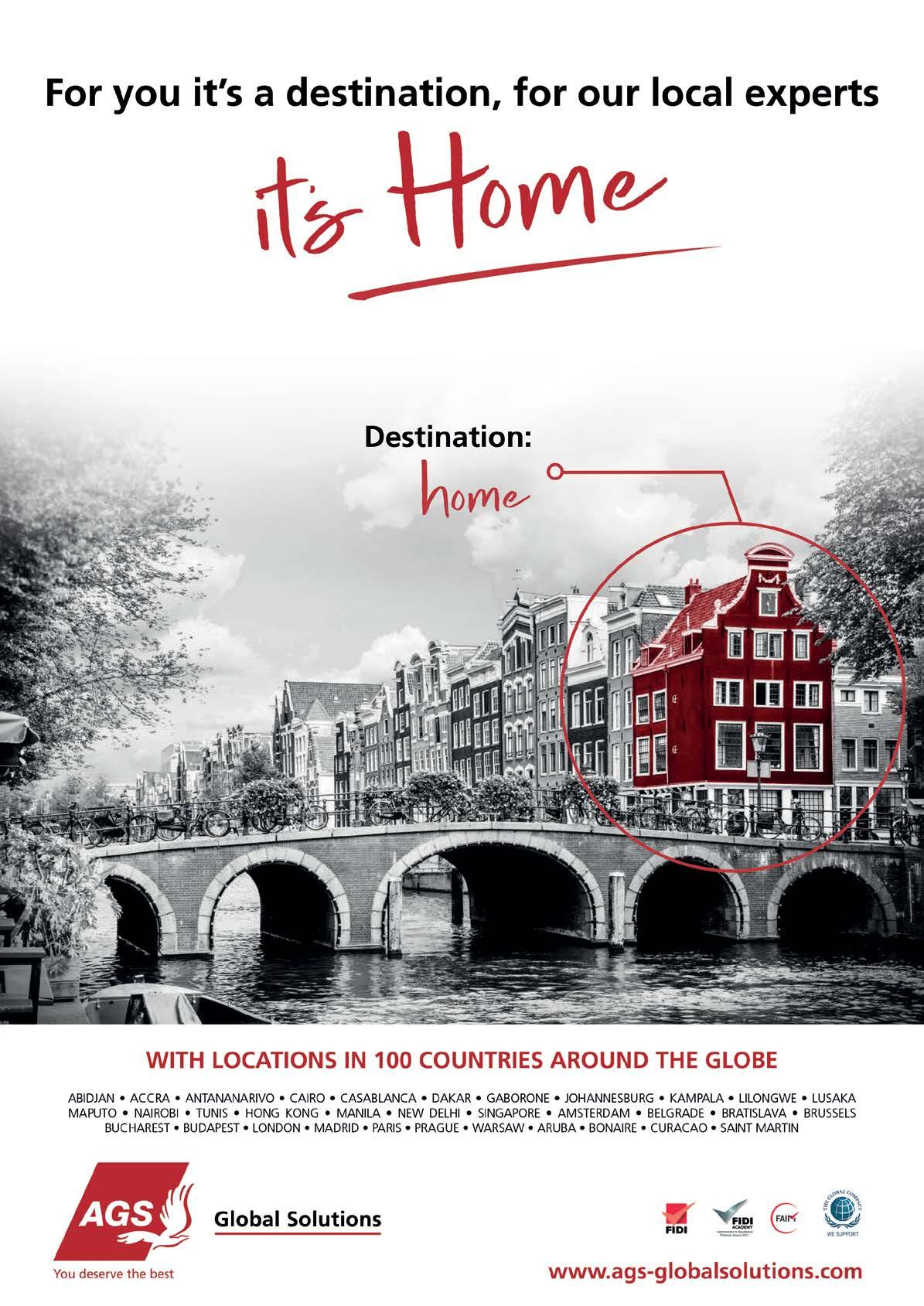

The recent demise of an RMC has sent shockwaves through the industry. FIDI Secretary General Jesse van Sas ask how movers and DSPs can protect themselves against the fallout from such events
So, it has happened: the bankruptcy of a relocation management company (an RMC in mobility industry jargon). Sure, Paragon Relocation was not a major RMC, but it was still a reasonably wellknown one, active in some niche markets, and with a good reputation, at least until recently.
The bankrupt RMC leaves behind significant debts – of close to US$12m – mostly owed to its supply chain, among which are many movers and DSPs, including some FIDI Affiliates. Chances of recovering money from the failed business are close to zero. This is a big loss for our industry.
There is a popular belief that RMCs are not prone to the usual liabilities in doing business. After all, they are part of the middleman economy, whereby any costs from the supply chain are just pushed on to the corporate client, plus a management fee. Where is the risk?
It is important to understand, however, that, while RMCs are indeed big companies – yielding a lot of power in corporate international relocation and having direct access to the major corporate clients –they are still businesses, and they can fail.
RMCs are attractive for movers and DSPs because they are large and supply huge amounts of work. Accepting their business, however, entails accepting their conditions, with long payment terms, continuous pressure on rates, free storage, a complicated way of invoicing, and auditing of your invoice by a third party, to name a few.
If you are happy with this, and you feel you are being paid a sufficient sum to cover all these extras, then by all means go for it. Reality tells us, however, that many entrepreneurs, including those in our industry, have an almost feverish focus on topline revenue only, expecting this to result almost automatically into a profitable bottom line.
This, however, is seldom the case. Large contracts with ultrathin margins usually lead to an ultrathin
and vulnerable bottom line, prone to further decline with the uncertainties surrounding our business.
It is also a reality that RMCs hold a vast part of the corporate international market. If you want to be relevant in that market, working with them is almost unavoidable. That is fine, as long as you maintain a healthy business mix of own-booked business, RMC work and agent work, and ensure that each of these delivers a healthy bottom line.
This means you should be selective in what to accept from RMCs or even large move managers, and perhaps even push back on their conditions, particularly on some of the credit terms they impose.
That is your right as an entrepreneur, and taking your eyes off that aspect can lead to losses as now sustained by some movers and DSPs in the Paragon case.
One final thought on the middleman economy in which RMCs operate: middlemen are absolutely pivotal to how the modern economy functions. They are the critical connectors that really do help the flow of goods or services from those who have them to those who want them; they overcome all those informational and logistical challenges that can otherwise impede a transaction that would really make all parties better off.
In our mobility industry, however, they have evolved into incredibly large and powerful middlemen – and these are being fed by very long supply chains, incorporating very long layers of other middlemen. This combination, that whole business model, instead of creating value and efficiencies, often leads to very significant and unappreciated costs, which clients and supply chains are now starting to bear.
The balance of power has tilted and brought opacity in ways that are far from optimal. It could lead to a change, and perhaps even to a partial return of corporate clients doing direct business with the ones actually doing the work. Be prepared for that.

130 million Population of Mexico
13th largest country in the world
1.47 trillion Mexico’s GDP in US$ (World Bank/OECD data)
7,000+ thefts from lorries in 2023 – 10 per cent up on 2022
2% of lorry drivers in Mexico are female
















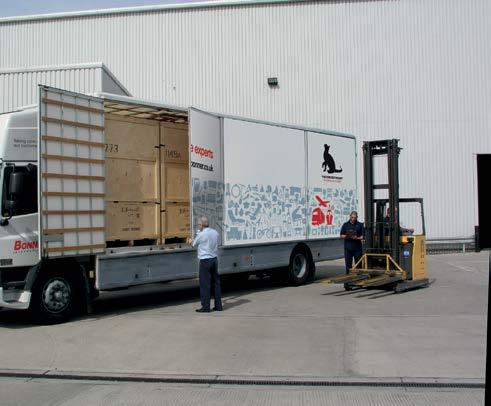

From whole house contents to cars, single items or pieces of art, no one is more careful than Doree Bonner International. We’ve been moving our customers’ possessions around the world for over 90 years - providing the highest standards of service at sensible prices.
For a free origin survey or destination rate, email us and get your clients move off to the ‘Purr-fect’ start. email: imports@dbonner.co.uk website: www.doreebonner.co.uk



Despite unique challenges – including navigating large and lawless regions – Mexico’s moving business is booming, spurred on by opportunities created by the pandemic and the entrepreneurial spirit of its operators. Andrew Mourant speaks to FIDI Affiliates about running a company in the country




Mexico is far smaller today than the vast, sprawling empire it once was – which, until the late 1840s, included many of the southern United States – but it remains the world’s 13th-largest country. Home to almost 130 million people, and with the biggest population of Spanish speakers, it is an industrial powerhouse with vast mineral resources and a wideranging service sector.
Despite well-documented border tensions with the US, proximity to the States is a key economic driver and stimulus for Mexico, not least for its moving industry. FIDI-affiliated company Mexpack International, which mainly focuses on global moving and destination services provision (DSP), is among those that benefit. ‘There are opportunities based on American companies wanting factories closer to the US without actually being in the US,’ says Lorne Dixon, Mexpack’s Quality Manager. ‘Some are moving production from Asia to Mexico.’
Creating global changes in supply chains is one of the legacies of COVID that has worked in Mexico’s favour. ‘It has made the country a key attractor of foreign direct investment (FDI) through nearshoring,’ says Alejandro Beltrán, CEO of CIME Mexico.
‘The north is set to benefit, particularly states close to the US border, such as Nuevo León –where the Tesla Gigafactory is expected to begin
“Nearshoring makes the country a key attractor of foreign direct investment”
production by 2025 – and Coahuila.’
Carmen Lerdo de Tejada Jr, Managing Director and CEO of Transcontainer, agrees, adding that Mexico has made ‘significant progress’ in trade and industry. ‘I believe there are opportunities for everyone,’ she says.
Transcontainer was already spreading its wings before the pandemic. From 2019-22, moves abroad rose 63 per cent for the Asia Pacific (APAC) region, 16.67 per cent for Latin America (LATAM) and 20 per cent for the US. Despite dropping in 2023, they remained 143 per cent higher than in 2019.
The firm’s mainstay trade – up 90 per cent – is international and domestic household goods, but trade shows, moving high-value specialist items with ‘white glove’ delivery, cargo, and distribution reflect Transcontainer’s intent to diversify.
For all that they have in common, each FIDI firm lays claim to some distinctive quality. For Beltrán, it’s CIME’s focus on a personalised service for international clients – ‘no relocation is ever the same’ – whereas for Roberto Balderas Dalmas, CEO of Balderas, which mainly serves private clients, it’s adapting to the ‘changing needs of housewives’. ‘We consider it


the most complicated niche to maintain, as it’s by recommendation,’ Dalmas says. ‘Clients want to be convinced they’ll get a professional service and “pampering”.’
Mexpack’s Dixon is a realist. ‘With the high number of moves and relocations every year, it’s impossible for every service to be perfect,’ he says. What sets Mexpack apart, he adds, is the speed with which it sorts out problems when they arise.
Thelsa Mobility Solutions, with 14 Mexican offices and a branch in McAllen, Texas, offers a wide range of services – from local, domestic and international moves to pet transportation. ‘Our mission is to integrate global relocation and logistics by following God-honouring principles – serving others and developing employees,’ says International Director Philippe Rodrigues. The firm’s mantra is ‘think innovation and never stay in the comfort zone’. ‘We’re a family business with a strong senior management structure, which guarantees continuity. We listen to our talent and can make quick decisions.’
Transcontainer staff have a ‘sense of belonging, love what they do and take pride in doing it’, says Lerdo de Tejada. ‘It’s how you act to resolve hiccups that makes a difference. We come through challenging times by being transparent, playing to our strengths, and finding a way to minimise any weakness.’
Few times were tougher than the pandemic, and changes forced upon the industry have become embedded in Mexico, as elsewhere, such as the rise of remote/hybrid working. The trend for his countrymen to adapt homes and weekend houses so they can work outside the big cities is, Dalmas says, ‘here to stay’. As is accelerated digitalisation, which is hastening the
“Our trucks must now take toll roads and cannot travel by night, and the trucks of our external suppliers are GPS-tracked”

adoption of virtual surveys, for instance. FIDI Affiliate Trafimar, which has 450 employees spread across five ports and 10 cities, now claims to be 100 per cent paperless and digitalised.
‘Technology has doubled,’ says Beltrán. ‘The younger generations have become industry leaders, accelerating their transitions into key leadership roles.’
Rodrigues believes transportation prices that were initially inflated by COVID have also taken root. ‘Transparent rates – which will probably oblige people to review shipment volumes – and sustainability requirements are key to understanding how the market will go,’ he says.
One good thing the pandemic has brought about is companies’ changed outlook on taking care of staff. ‘There’s been an important refocus on the wellbeing of our people and customers,’ says Trafimar CEO Francis Toedtli, whose firm’s business spans international and domestic moves, last-mile delivery and logistics, and includes a shipping agency. ‘We’re reinforcing our investment in technology to help all this along.’
Transcontainer now provides a health service benefit for employees and their families, offering physical and psychological care, while Dixon says the pandemic spurred on Mexpack to better safeguard the health of staff and clients. ‘We take more precautions than before to avoid spreading even a basic cold.’
Precautions against spreading disease aren’t the only duty-of-care concern for FIDI members. They must also grapple with Mexico’s pockets of lawlessness. Some parts are pretty much no-go areas. In fact, between January and September 2023, Mexico recorded more than 7,000 thefts from lorries – 10 per cent more than for the same period in 2022 – mostly involving violence.
‘We turn down business rather than expose colleagues to unnecessary risks,’ says Dixon. ‘However, crime exists outside the “lawless” parts, and we do our best to maintain contact with our colleagues at all times [via GPS-tracked vehicles and other security policies].’
Transcontainer reports that violence involving criminal groups has created heightened insecurity, not least in border areas. Basic precautions include not driving at night or through unsafe regions. ‘We’ve tried to maintain a low profile – as a company transporting used household goods, thankfully we’ve never been the target,’ says Lerdo de Tejada.
Route planning, GPS coverage, security and coordination with the truckers’ association local contacts are all used to help keep Trafimar employees safe. ‘We work with security consultants to stay updated about the risks with Mexico and beyond,’ says Toedtli.
For Balderas, the ‘complicated issue’ posed by bandit country has forced his firm to ‘reinvent and look for training and technology-allied solutions.’
Thelsa has adapted in a similar way. ‘Although household goods aren’t really a target, our trucks must now take toll roads and cannot travel by night, and the trucks of our external suppliers are GPS-tracked,’ says Rodrigues. ‘The only good thing is that we’ve


grown creative in finding solutions. At the end of the day, businesses and people needing to relocate to Mexico will do so.’
Problems can also arise at ports, though less so in recent years. ‘Bribery with customs officials went out of fashion a while ago,’ says Dixon. ‘Today’s officials and military personnel who manage the ports interpret the law without much flexibility. Items that aren’t strictly used household goods are confiscated and business licences are at risk of being lost.
‘Whenever shipments follow the rules, we’ve experienced no delays. The trick is to follow the guidelines. Bribery in order to move a shipment through faster isn’t an option.’
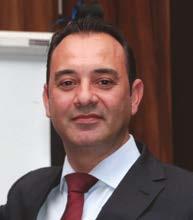
Thelsa, too, makes a point of shunning dubious operators. ‘In the past two years, we’ve been working on alternative logistic solutions to counteract the challenges they present,’ says Rodrigues. Balderas, meanwhile, has chosen to contract customs services with agencies, supplying client documentation beforehand ‘in order and conforming to the laws of each country’.
The lure of the US dollar, the move towards home working, and the prospect of running into roadside bandits don’t augur well for recruiting new blood. Women drivers, especially, are few and far between. Globally, less than three per cent of truck drivers are female and, in Mexico, women make up just two per cent of a 500,000-strong workforce.
‘In general, it’s difficult to attract new people to removals – it isn’t a sexy industry to outsiders,’ says
“We’re just looking for hardworking ‘crazy’ people –gender or age doesn’t matter”
Dixon. ‘Either you’re born into it, or you fall into it by accident and stay because you’re crazy. When someone comes for interview, we need to sell the industry. We’re just looking for hardworking and “crazy” people – gender or age doesn’t matter.
‘Female drivers haven’t had many opportunities and we offer these for everyone. But because of traditional cultural norms, it’s unlikely there’ll be many in the near future.’
Trafimar has also experienced a growing challenge in attracting people. ‘There’s a shortage of drivers because of the increased demand and growth of freight, and the fact that Mexican drivers now operate legally in the States,’ says Toedtli. ‘However, we’re blessed to have several generations of packers who are “artists” in their trade.’
Beltrán can also struggle to find recruits with the right qualities. ‘However, it’s fascinating to witness the increasing presence of women in traditionally male-dominated roles,’ he says. ‘I believe women packers display more attention to detail than men and (with drivers) we’ve seen them show a precision that exceeds many males – though it’s a challenge for them to drive across the country.
‘Our operations director is a woman, a role historically held by a man, yet we cannot imagine
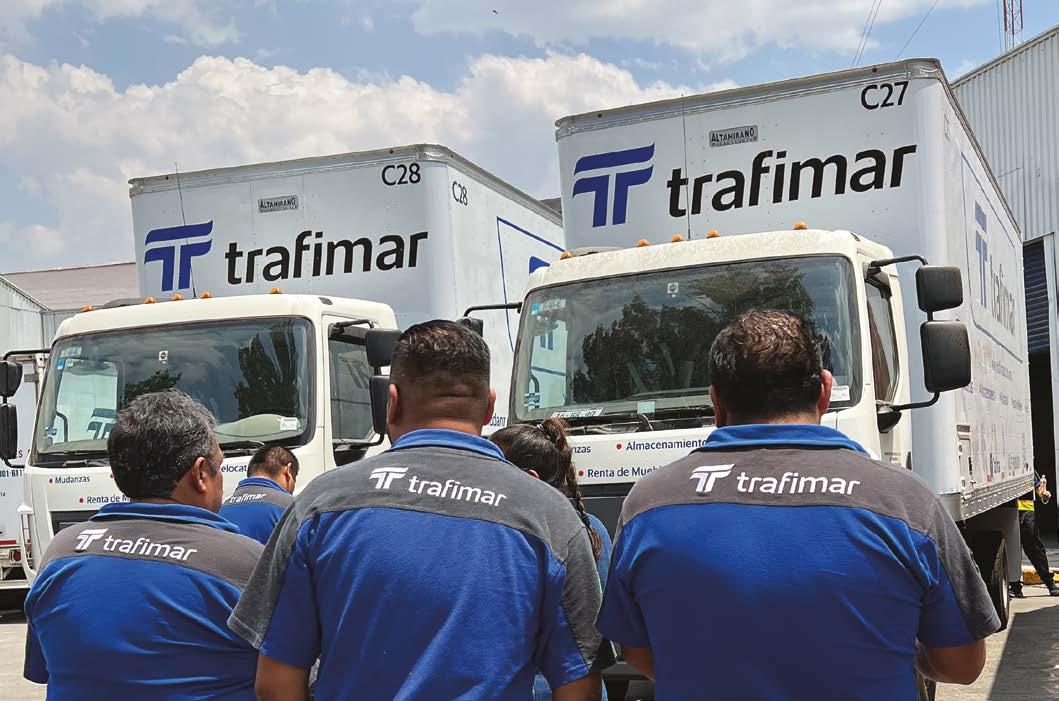

anyone else in that position – her work is exceptional.’
Balderas’s philosophy is to grow personnel internally. ‘They’ll start as stevedores, packers, and over time become heavy truck drivers,’ says Dalmas. ‘But because of the lack of operators in the US, companies there are offering high salaries. That leaves a labour void in Mexico, which is why there are now training schools for women – the first generations are already on the roads.’
These days, Rodrigues points out, people may be unwilling to accept that the time and effort they put in – removals is often hard work – equates to the financial and personal rewards they’ll receive. ‘With all the challenges our industry has suffered, it can be difficult to fully satisfy a customer.’
Moreover, he adds, the young may be more attracted
to technology-orientated careers and the salaries that go with them. ‘The competitiveness of removals and concentration of the control of the global business have impacted on our margins. Every year it becomes more difficult to compete with the pay in other industries.’
Thelsa has a policy of trying to balance the gender ratio at all levels. ‘I’ve always had more women in my teams, as I’ve found them committed and good at multitasking – they offer a different viewpoint and are very good at communicating with customers,’ Rodrigues says.
‘We’ve implemented a programme to have more of them in our operational teams. Mexican society is still very patriarchal, but we’re proud of increasing the number of women in strategic roles.’


There’s nothing new about mitigating risk in international business, but more threats are being faced by those who ship goods around the world than ever before. Just as the COVID-19 pandemic recedes, threats such as new armed conflicts have emerged – and the risks embodied by climate change have accelerated. So it is more important than ever for moving companies to consider their insurance strategy carefully, writes
Andrew Bennett
Disruption has become the new norm in international trade. As the world recovers from COVID-19 and the chaos this caused, new factors such as wars in the Middle East and Ukraine, attacks on shipping in the Red Sea, and piracy have added to the pressures.
Insurance is not usually a topic that provokes strong passions, but, given the world today, it is more crucial than ever. As many movers are finding, however, insurance premiums are more expensive than before.
Of the global insurance market, Boris Populoh, Managing Director at global insurance service provider UNIRISC, Inc, says: ‘Overall inflation, coupled with climate change and an increased severity and frequency of weather-related disasters, have put insurers under pressure to offset mounting losses.’
Insurers have found that one way of counterbalancing the impact of mounting claims is to increase the cost of coverage, while limiting their ‘exposure to certain categories of risk’.
Populoh adds: ‘When looking specifically


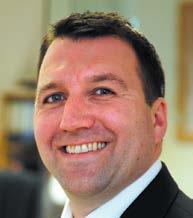
at the markets that provide coverage to the global household goods relocation industry, we see a shrinking pool of underwriters willing or able to offer coverage.’ He believes this trend is likely to continue into the near future.
A significant impact on both domestic and international moving insurance has been an increase in the frequency and severity of household goodsrelated claims in the years 2021-22.
Pandemic lockdown measures across the globe led to worldwide supply chain and transportation disruptions and delays. According to Populoh: ‘Those delays caused thousands of containers laden with household goods to sit idle for months at ports across the world. As a result, they were exposed to the elements and insurers saw a significant increase in mould and mildew-related claims once those containers began to be delivered.
‘Subsequently, these factors contributed to significant losses for most underwriters – losses that must be recovered via increased premiums.’
The past few years have seen new risks emerge and be addressed by insurers and those involved in shipping household goods consignments. A recent issue is the inclusion of items containing Lithium-ion (Li-ion) batteries in shipments.
Li-ion batteries are used to power electric cars, e-scooters, e-bikes, power tools and hover boards.
“A fire involving Li-ion batteries can rapidly increase the heat of the fire from anywhere between 400°C and, in some cases, upwards of 2,000°C”
Their potential risks came into focus with vessel fires, including a well-publicised blaze on the Fremantle Highway off the coast of the Netherlands in July last year. This involved electric and hybrid vehicles on board, and showed the intensity of such fires.
In response, shipping lines have been taking steps, with some specifying that any Li-ion batteries in consignments be separated from other goods and declared as hazardous cargo.
Writing about the potential risks of such batteries for the moving, shipping and storage industries, Malcolm Pearson, Managing Director at insurers Reason Global, says: ‘There are concerns around vehicles and vessels transporting these items and the risk of combustion in transit, as well as about warehouses holding items in store being at risk – or simply the accelerant factor that batteries might provide should another cause start a fire.
‘It has been recorded that, in a fire involving these batteries, a process called thermal runaway can occur, which can rapidly increase the heat of the fire from anywhere between 400°C and, in some cases, upwards of 2,000°C. This is allied to the fact that the temperature rise can happen in milliseconds.’

All risks
The broadest form of insurance coverage available, providing protection against all perils of physical loss or damage. All Risks will always carry an element of exclusions, which should be clearly stated in the policy summary.
Total loss only
An insurance policy that covers only the total loss of an entire consignment from an insured peril.
A partial loss, even from an insured peril, is not covered by a Total Loss Only policy.
Certificate of insurance
A document issued on behalf of an insurance company covering a specific shipment. It states the terms and conditions of the insurance, and is subject to the
terms and conditions of the underlying cargo policy.
Either a percentage of the insured value of the shipment or a fixed monetary amount that is subtracted from the total amount of the claim.
General average
This is the apportionment of financial liability for the loss arising from the jettisoning of cargo by dividing the costs among all those whose property (ship or cargo) was preserved by the action.
Liability insurance
Insurance to cover the legal responsibility of the mover.



While many devices and machines use Li-ion batteries ‘safely and without issue’, there has been an increasing sense of concern about the dangers of equipment containing this type of battery.
Pearson says: ‘This has caused many in our industry to question the safety of such items in moving or storage consignments, and the potential exposure for companies and insurers… even if Lithium-ion batteries are not the cause of a fire, they are undoubtedly strong accelerants of one if present.’
Recent bans on carrying e-scooters on various forms of public transport highlight the new Li-ion battery safety climate.
‘The first area that the household moving and storage industries have already considered is whether the contractual relationship between company and client needs to be refined to place an element of responsibility with the consumer,’ adds Pearson.
‘The self-storage industry has already adjusted its terms around Li-ion batteries. Moving companies are likely to be looking closely at this in the coming year, with a view to a similar approach.’
In January, the British Association of Removers (BAR) Overseas Group issued a recommendation that Li-ion batteries are not shipped. In guidance
to its members, the BAR said: ‘The acceptance of Li-ion batteries in household and personal effects shipments is a complicated subject. There is a widely reported increased fire risk associated with these batteries. Shipping lines themselves are so far inconsistent in standardising their rules for their inclusion or exclusion from a consignment. Typically, we experience that shipping lines will decide on a shipment-by-shipment basis whether Li-ion batteries can be included.’
Several other issues have also become a larger threat, including the increased severity and frequency of storms. According to Gadi Binness, President and CEO of Relocation Insurance Group, an online insurance agency: ‘Research published in science journal Nature warns that 1.8 per cent of global maritime trade is at risk every year, and cyclones are the main cause.’
‘Attacks on ships are another issue,’ he says. ‘The ICC International Maritime Bureau reported an increase in pirate attacks in the first part of 2023. Meanwhile, Houthi rebels have been targeting ships in the Red Sea with missiles. S&P Global reports
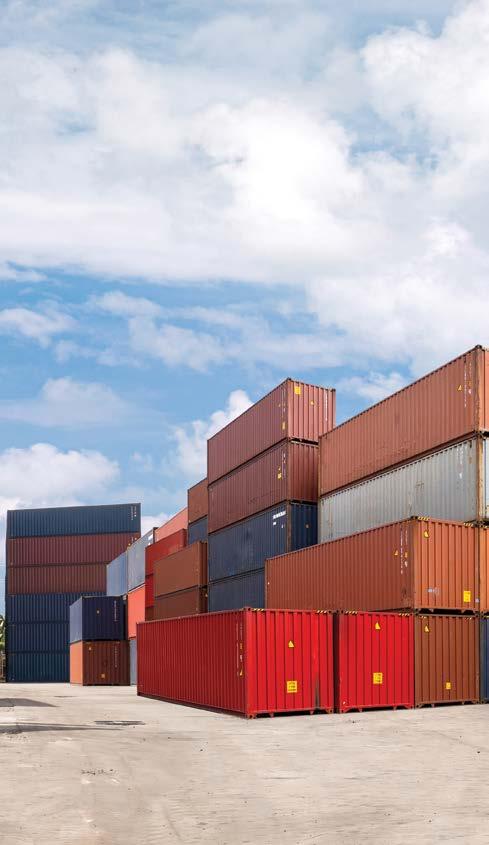
“Many individuals and companies don’t take time to review their policies until a critical need arises”
that insurance costs have increased as a result.’
Binness advises that companies that facilitate international moves ‘must consider mounting risks when creating an insurance strategy to protect their customers’ valuable cargo’.
There is also the risk of cyberattacks and the increasing use of an insurance protocol known as ‘general average’. When containers need to be jettisoned or another emergency action taken at sea, financial liability for the losses incurred are shared by all parties. Therefore, moving companies who have consignments on board will be responsible for meeting a proportion of the expense.
Last year, a fire onboard cargo ship NYK Delphinus highlighted the perils faced by ships at sea, and the risk of knock-on effects for cargo owners.
Japanese carrier NYK, part of Ocean Network Express, declared ‘general average’ on the NYK
With a wide range of options in the market, how can moving companies ensure they and their customers are protected at a time of crisis, or when the unexpected (and undesired) happens?
Going without insurance would be a step too far. Without it, individual financial liabilities and the risks presented by each household goods shipment would have to be covered directly by the service provider.
In the event of a claim for ‘total loss’, movers could face a claim of US$200,000 or US$300,000 to be paid directly – a significant liability, likely to be beyond the resources of many moving companies.
In terms of overall advice, Gadi Binness says: ‘Ensure that shipments have relocation insurance in place to protect goods at every step: at sea, in port and on land – and, possibly, while in storage. Finally, it’s important to know which risks are covered, including natural disasters, as well as crime and political conflict.’
Boris Populoh says moving companies should assess their specific insurance requirements and make sure they compare like with like in terms of policies and provision.
‘Policies and associated coverage levels can vary significantly from insurer to insurer,’ he says.
Movers should make sure they understand what risks they wish to mitigate and choose a policy that provides appropriate coverage levels.
The need to understand the deductible structure is also
highlighted by Populoh. A deductible, like an excess on car insurance, is the amount movers pay before the insurance coverage kicks in. It is best to choose a level that matches your company’s riskmitigation strategy.
According to UNISRIC, it is also important to confirm the financial strength of the insurer/broker underwriting your policy.
‘A financially stable insurer is more likely to fulfill its financial obligations (pay claims), especially during large-scale events or economic downturns. The same holds true for the broker providing other underlying services, such as claim adjusting, counselling, billing, and other ancillary services,’ said Populoh.
Movers are also recommended to evaluate the broker’s or insurer’s claim process. Research reviews and the insurer’s reputation for handling and paying claims promptly and fairly.
When comparing premium costs, movers are advised to make choices based on coverage, service levels and the financial stability of the provider. Other factors are the limits of policy coverage and any specific policy exclusions or limitations.
The financial impact of ‘general average’ (see main article), when this occurs, also needs to be taken seriously, according to Reason Global, which advises that marine insurance should include cover for this protocol.


Delphinus following an engine fire while en route from the Port of Vancouver to Oakland, California, in May. The vessel was 50 miles offshore from Monterey when the US Coast Guard responded to a request for assistance.
The crew brought the fire under control and tugs then towed the ship towards Oakland, its destination port. However, for clients with goods and/or containers onboard, this wasn’t the end of the story.
A fortnight after the fire, NYK announced it had appointed Oceana Marine Claims & Adjusting and Marine Adjusting Solutions as the average adjustor, stating that it would be ‘responsible for coordinating the collection of general average securities and all documentation required from parties with interest in cargo onboard, containers, vessel, and vessel fuel’.
According to Reason Global, the declaration of general average was once a rare occurrence, but ‘has been more common since the turn of the century’.
Reason’s Pearson says: ‘The costs that are redistributed following the declaration can be
“With the world increasingly unpredictable, how international moving companies manage their level of risk is now imperative”
significant and could potentially affect cargo owners, including the refusal to release goods until the owner accepts responsibility and any associated costs.’
Circumstances in which general average can be properly declared by the ship’s owners/master must include events beyond the ship owner’s control (such as storms) that imperil the entire venture, a ‘voluntary sacrifice’, or an item being saved.
The ‘sacrifice’ might involve the jettisoning of specific cargo, the use of tugs or salvors, or damage incurred to the ship.
With the world increasingly unpredictable, how international moving companies manage their level of risk effectively is now imperative.
UNIRISC’s Populoh says: ‘You don’t need insurance until you need it. Unfortunately, many individuals and companies don’t really take the time to review and understand their policies until a critical need arises.’
Relocation Insurance Group’s Binness adds: ‘Despite the rising insurance costs, cutting corners on insurance could lead to uncovered risk exposures and substantially higher loss costs. Without smart coverage, international moves could simply become too risky.’


FIDI Associations are charged with being active on behalf of their members, representing their interests at the national and international level. FIDI Focus speaks to Max Ajroldi, President of FIDI Italy and ANIT, about his challenges and fighting to reduce admin and red tape for the benefit of Affiliates in the country
F IDI Focus (FF): What is your role as President of FIDI Italy and ANIT?
Max Airoldi (MA): My role is to represent FIDI Italy and ANIT to FIDI and non-FIDI meetings. As President, I also need to lead the way in a constantly changing business.
FF: What is unique about Italy’s moving business – and what is happening in the country at present?

MA: The market has slowed down and is still trying to recover from the impact of COVID. In addition, we are facing increased costs, which is a huge problem –particularly against the background of our business partners offering lower rates. In European countries at least, this is the major hurdle for the foreseeable future. Last but not least, finding drivers, packers, porters and other blue-collar workers is an ongoing problem.
FF: What are the challenges you face as President of the association?
MA: Keeping the FIDI Italy family focused on providing an excellent service in a competitive world that is becoming more demanding by the day.
FF: Why is your association important to its members?
MA: We are an association of international moving
companies that share the common goal of trying to solve problems in the industry that we face today – while looking ahead to anticipate future challenges.
FF: What are the most important issues for your members?
MA: Trying to find young talent willing to enter the industry and learn from the experiences of those that came before them. Bureaucracy in Italy presents us with an everyday battle: as President, I would like to streamline the paperwork we are required to complete and reduce administrative costs for our members.
FF: What do you hope to achieve during your time as President?
MA: To retain all our current Affiliates and, ideally, to increase our numbers.
FF: If you had one message for FIDI’s membership around the world, what would it be?
MA: FIDI is increasing the level of quality expected from its membership every year. This isn’t easy to live up to, but never give up: the only way we can distinguish ourselves from our competitors is through quality.
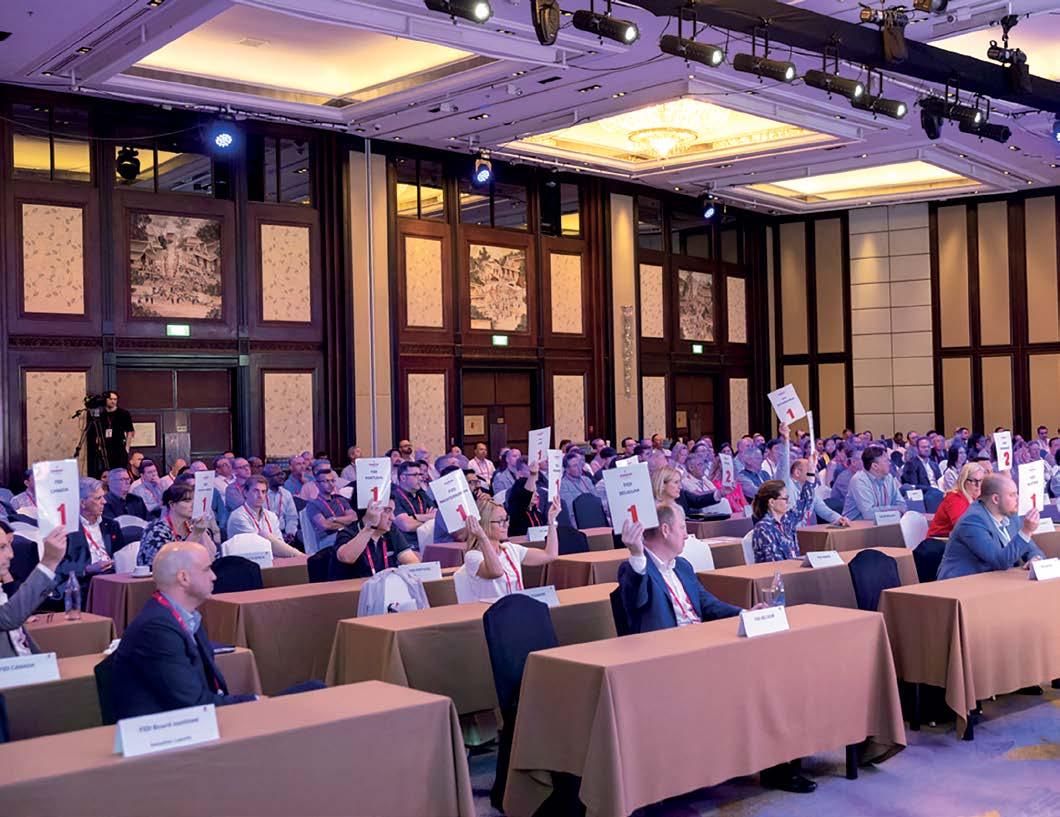

Lydia Cope describes how FIDI’s Statutes govern the setting up of a FIDI Association. In previous issues of FIDI Focus, we have discussed why FIDI Associations exist, their areas of responsibility, and how they communicate with their membership, and with FIDI
FIDI currently has 27 FIDI Associations, which together represent all Affiliates across the world.
As defined by FIDI’s Statutes, these trade associations are officially FIDI members, and are voted into existence by FIDI’s General Assembly. They represent a body of removal or DSP companies that operate in the relocation business in their country or region.
To qualify as a FIDI Association, the trade association must represent a majority of Affiliates in its territory. To form a new FIDI Association, there must be a minimum of three Affiliates in the territory, and the association must have an independent financial account, with its board of
directors nominated and elected by FIDI Association members.
All Affiliates in the territory covered by an existing FIDI Association must join it to maintain their FIDI membership. Affiliates are encouraged to make use of their association membership by attending local FIDI Association meetings and familiarising themselves with the key people.
As well as looking at local matters and assisting members, FIDI Associations, as FIDI’s governing members, are up to date on the latest FIDI developments and, as the voice of their members, exist to share any concerns or questions you have about FIDI, its services or upcoming developments.
Thanks to our community volunteers who serve on the FIDI Association Boards, FIDI’s governance is representative of its members.
If you have any grievances against your FIDI Association representative, you can send an email to ombudsman@fidi.org
Your message will be treated with discretion by FIDI’s Secretary General.
To find the latest list of FIDI Association representatives and their contact details, please go to FIDINET.
l For more information about the roles and responsibilities of FIDI’s Associations, see FIDI Focus issue 312 (December 2023 to February 2024).
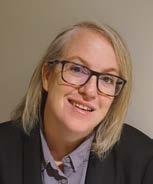

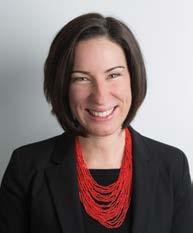
As the preparations for the 2024 FIDI Conference reach their peak, FIDI Sustainability & Strategic Communications Manager Magali
Horbert gives a sneak preview of this year’s programme – and an overview of how to make the very best of the annual sessions, events, and networking
We’re just weeks away from meeting in Edinburgh for the FIDI Conference, from 12 to 15 May 2024. As the anticipation and excitement grows, we can’t wait to dive into all the learning, networking, and unforgettable moments that await us in Scotland’s heartland.
As you plan your journey to Edinburgh, consider making your travel choice a part of your contribution to sustainability. Edinburgh is wonderfully accessible, offering a plethora of travel options that cater to convenience and eco-friendliness alike. Why not turn the journey itself into an adventure by choosing the train from London, for example? This option isn’t just about reducing your carbon footprint; it’s an opportunity to witness the stunning landscapes that the UK has to offer, making your trip to Edinburgh a memorable experience from the start.
To encourage participants to ‘travel green’, the FIDI 39 Club has launched the ‘sustainable travel initiative’. By participating, you stand a chance to

12 Ma y - 15 M ay
win a complimentary registration for next year’s conference in the Croatian city of Dubrovnik.
Participating is easy – you will find all the details on pages 64-65. Let’s make our way to Edinburgh with a sense of purpose and a commitment to the planet.
At the FIDI Conference, we take networking seriously – and focus on quality over quantity. Make every connection count, whether it’s sharing a laugh at the welcome reception, finding common ground during the gala dinner, or exchanging ideas at the social events.



We strongly recommend that you avoid scheduling back-to-back business meetings, as this is not the main purpose of our event.
Leave ample space for meaningful connections and register for the social events and business sessions, where you will really get to know your fellow participants and forge relationships that will go beyond a business agreement.
The FIDI Conference is the time for you to get your company out there – so make the most of it (see p47). And don’t forget, the FIDI Conference app is your best friend for keeping in touch with your fellow participants before and during the event, share your thoughts and impressions, and to keep up to date with the programme.
In anticipation of a successful 2024 FIDI Conference, it’s important to revisit the expectations surrounding conduct and professional behaviour during our gathering. Appropriate behaviour is expected at all times from all attendees throughout the conference. FIDI is committed to creating a respectful, inclusive, and harassment-free environment for everyone involved. Any form of misbehaviour, discrimination, or harassment will not be tolerated under any circumstances.
We hold our values of professionalism, respect, and integrity in the highest regard and expect the same from each conference participant. This stance is crucial not only for maintaining the quality and safety of the event but also for ensuring that every attendee can enjoy and benefit from the experience
without concern. FIDI will enforce this policy vigorously and asks all attendees to contribute to a positive and respectful atmosphere, where open dialogue, mutual respect, and professional growth can flourish.
Even though we all enjoy the socialising, the business sessions are a central part of the conference. This is where we get to learn from the best about what’s shaking up our industry, how to stay ahead of the curve and find solutions to our shared challenges.
This year, we’re excited to welcome Lucas Simons, a prominent figure in corporate sustainability and change, as our keynote speaker. Simons isn’t just another speaker; he’s a pioneer in the field of sustainable transformation, having dedicated his career to changing how industries think about and implement sustainable practices. His book, Changing the Game, has inspired countless businesses to take a hard look at their operations and find ways to be more environmentally friendly and socially responsible.
Simons founded NewForesight, a consultancy that’s been instrumental in guiding companies and entire sectors on their journey toward sustainability. During his 45-minute keynote, right after roll-call on Monday morning, he will share his wisdom on how we can make significant, meaningful changes in our industry. He’ll break down complex concepts into actionable steps

and show us how each company, no matter its size, can contribute to a larger, industry-wide transformation – to everyone’s benefit.
Expect to leave his talk not just inspired but equipped with practical strategies that you can start implementing right away.
Panel conversations always give food for thought; each session is designed to not only address the current landscape but also to prepare us for the future, making sure we leave the conference more knowledgeable, connected, and inspired than when we arrived.
They’re crafted to challenge our perspectives, encourage dialogue, and foster collaborations that extend well beyond the conference itself. With topics ranging from navigating complex business environments to embracing sustainability and attracting the next generation of movers, these panels are a key part of our shared path to improving our industry.
Navigating the global mobility landscape is tricky, with its vast network of clients and suppliers each wielding significant power. This session will dive deep into the art of balancing these relationships while protecting your margins and upholding strict compliance standards.
Our panellists, who have been in the trenches and represent different sides of the equation, will share their insights on leveraging quality and compliance as non-negotiables in business discussions.
We’ll explore real-world strategies for asserting value over price, ensuring that excellence, rather than the lowest bid, defines our industry’s standards.
The world is unpredictable, and our industry often finds itself at the frontline of global crises. This session is about resilience, adaptability, and the critical role we play during emergencies.
Drawing from first-hand experiences of FIDI Affiliates, we’ll look at how companies navigate past crises, from pandemics to geopolitical tensions. This discussion will go beyond just storytelling; it aims to arm you with strategies for crisis management and proactive planning, ensuring your business can withstand whatever the world throws at it.
Attracting young talent is one of the industry’s pressing challenges. This panel, steered by Jackie Stouffer, FIDI 39 Club President, will shed light on what the next generation is looking for in their careers.
We’ll discuss how to present the moving and relocation industry as a vibrant, appealing career choice, highlighting innovation, flexibility, and the opportunity for meaningful work.
Panellists will share success stories and lessons learned in recruiting and retaining young professionals, offering a blueprint for building a workforce that’s ready to take our industry forward.
The business programme isn’t just about these big sessions. There will be workshops on the FAIM Compliance Procedure, the FIDI Netting project and the FIDI Carbon Calculator project, as well as FIDI Focus Fringe sessions. Make sure to check out the FIDI Conference app for all the details and to sign up for extras that catch your eye.
As we gear up for Edinburgh, let’s get ready to soak up every bit of knowledge, connect with our peers, and make this conference one for the history books.
Forward-thinking Affiliates can use their experience at the FIDI Conference to turbo charge their network and company profile well beyond the event itself. FIDI Marketing Officer William Zamundu explains
As we make the final preparations for the FIDI Conference in Edinburgh, we want to make sure that attendees have all the tools in their hands (and pockets) to make the most of this special event.
The FIDI Conference is not just about seeing old friends and shaking hands; it’s about making new connections, getting your company on the radar, and learning from the best in the business. In fact, these principles apply to any FIDI event, whether in person or online.
If you prepare well, events can be a great place to market your company. In this article, we will look at how you can leverage FIDI events for marketing success, especially if it’s your first time. We will explore the opportunities that lie in sponsorship and networking, and how to share your event experience.
FIDI offers many opportunities for you to maximise your company’s visibility within the FIDI network and beyond: through FIDI Focus advertising and sponsored content, Academy trainings, webinars, and, of course, the FIDI Conference. Conference sponsorship opportunities significantly boost brand visibility by putting your company name and logo in front of the eyes and minds of attendees and beyond. This is particularly interesting if you are new to the FIDI network, or your company has recently gone through a major rebrand.
For any event participation, but especially when sponsoring, company branding needs to be professional, and have a message that is tailor-made for its audience.
By appealing to the interests and familiarity of



your audience, you become relevant and memorable. Prominently displaying the company logo in conference materials, email signatures and digital platforms improves brand recognition. However, be mindful of your environmental impact: think sustainable and avoid printed material and assets that won’t be used on other occasions. Avoid printed banners, flyers and plastic giveaways, and opt for digital presentations and assets. By doing this, you show leadership and will appeal to the sustainability crowd, a growing movement in our industry.
Remember, at B2B events, people pay the most attention to your online presence. So, make sure it’s fast and easy to find. Get creative with your presentation – such as making a special landing page for your website. This can be updated every year without printing new material. Here are three best practices to keep in mind:
l Think mobile first: ensure any digital presentation or website is optimised for mobile phones, as this will be the main entry point for event attendees
l Have a form to gather people’s contact information, so you can follow-up with them after the event. QR codes that lead to a simple webform work well for this
l Stay consistent with your messaging and visuals.
While having a digital presence is crucial, it’s how we share info on social media that can really make the difference. Staying active on social media, especially during events like the FIDI Conference, can expand your audience and create some serious ‘FOMO’ for those who couldn’t make it.
For instance, sharing photos of your conference experience and activities can grab attention for you and your company, as people you meet will engage with your posts. This demonstrates to clients that your company is part of a global community. Plus, by publishing blog posts, social media updates, or videos summarising key conference points, you position your company as a thought leader for partners and clients.
However, we understand that content creation
is not simple. Without a team, it can become overwhelming. FIDI will be super active on social media during the conference, and engaging with our content can bridge the gap. We recommend reposting with your own thoughts or comments; it demonstrates thought leadership and boosts your visibility among FIDI’s followers. Interacting with and sharing FIDI’s content saves time and effort in creating content from scratch.
During the conference use the hashtags #2024FIDIConference and #FIDIconference. Mention us in your posts so that we do not miss it; use @FIDI Global Alliance on LinkedIn, Instagram and Facebook.
Networking is the main reason for participating in events; they are the opportunity for industry professionals, who otherwise communicate online the rest of the year, to meet in person and forge valuable connections and partnerships.
And what is special about the FIDI Conference is that the programme provides many social activities where you will get to know your fellow participants in ways that 20-minute meetings won’t ever allow. Make the most out of this deep personal networking by avoiding scheduling back-to-back business meetings and signing up to the social events and tours, as well as actively participating in the business sessions and workshops.
As a conference attendee, you also get access to the FIDI Conference app. Use it beforehand to connect with other participants, share your thoughts on the event’s message board, and keep track of the programme. Just remember to respect others and avoid using the messaging system for your own advertising. It can backfire and give your company a bad reputation before the event even begins.
In addition to exchanging contact information with industry peers and prospects, make sure you also follow up on conversations after the conference – which will nurture relationships for potential collaborations or referrals.
Moving and relocation is one of the most peopledriven industries, not least because of the strong long-term partnerships that characterise the FIDI network. Make sure to maintain the relationships you made in person during the event – but avoid copypaste spam-type messages to all attendees. Keep it personal and professional.
In a nutshell, embracing the FIDI Conference as a platform for networking, branding, and digital engagement can turn it into more than just a gathering of business partners and friends – it can become a vital part of your marketing playbook, and help your company stand out from the crowd.
l Do you have questions or need help with your marketing strategy for events? The FIDI marketing team will be happy to assist you. Send your questions to marketing@fidi.org




There have been significant updates to FASI’s operating rules, including some introduced at the beginning of 2024. Marie-Pascale Frix, FIDI Business Intelligence Manager, gives a need-to-know guide to the main changes

During the past two years, the operating rules for FASI have undergone major changes of which all FIDI Affiliates should be aware in order to adapt their bookkeeping and automate the reporting of the AR to the online FASI platform.
Here is a recap of the new rules:
1. The reporting window has been reduced to 75-105 days.
2. New exclusions* have been introduced, which are:
l Invoices with ‘set payment terms’ exceeding 105 days.
l Demurrage, detention and/or port storage charges exceeding a value of €1,000 or equivalent per customer file.
3. Extended scope: Invoices regarding domestic removal services can be reported if the FIDI Affiliate Booker and origin agent/destination agent are located in different countries (i.e. the transaction is international).
4. Reduced creditor cap at €100,000: This means that if you let one of your agent’s debts grow beyond €100,000, you are not fully protected by FASI.
5. Frequent Offender in FASI:
l If your company (debtor) is listed seven times or more in a rolling year as a Frequent Offender, a monthly administration fee of €500 will be invoiced to your company.*
l If you still appear as a Frequent Offender after 18 months, your company will be facing immediate membership termination.
6. Publication of the Frequent Offenders’ names on FIDINET.*
l On reaching FASI Frequent Offender status, your company’s name may be published on FIDINET if it fulfils the requirements set out in the FASI Operating Rules 2023.
7. Termination threshold reduced from 240 days to 180 days.*
*These rules came into effect on 1 January 2024.
l Not using FASI yet? For all queries, consult FIDINET or contact Marie-Pascale Frix, in charge of FASI, at: Marie-Pascale.Frix@fidi.org















Ignacio Alcalde has retired from the position of Senior Project Manager at World Bank Group, after 23 years overseeing staff moves for placements around the globe. FIDI Focus Editor Dominic Weaver speaks to him about his time at this significant moving services user and why he introduced FAIM accreditation as a requirement for partners, and meets his successor, Peter Bowsher

Ignacio Alcalde
After almost 23 years overseeing the day-to-day management of household goods (HHG) shipping and storage for employees travelling to and from ‘anywhere you can think of’, Ignacio Alcalde has retired as Senior Project Manager at World Bank Group (WBG)
Recruiting and employing staff from all over the globe, WBG works in more than 170 countries, with overseas offices mainly in developing countries. International assignments for its employees last between two and five years, depending on location.
Alcalde’s role included managing the often-emotional side of staff relocation, helping them overcome the difficulties associated with a move to give them and their families the best experience possible
frequent updates and to send a weekly or bi-weekly status report to each transferee.
‘I’ve learned that transferees hate having their belongings picked up and then not hearing from anyone until they ask, or are contacted with a problem.’
Recognising that a high-quality move supports the quality of an assignee’s performance, Alcalde became a driving force that made WBG one of the first international customers to insist on using FIDIaccredited businesses for its moves.
moves. We were already seeing the number of moves increasing before my retirement.’
There has also been a significant increase in moves to third countries, where assignees move immediately to a fresh placement, rather than returning to head office on completion of an assignment.
“Setting quality standards, as FIDI does, has changed the industry for the better. Dealing with reputable companies is a must, and even better for them to be FAIM-certified”
‘Once an employee secures a position overseas, they are under pressure to close projects in their current job and report to their new position as soon as possible,’ he explains ‘This can create stress and anxiety, not only for staff members, but also for their families.
‘Given the location of most country offices, relocating staff are challenged to find proper and secure housing, and schooling for their children, and face long transit times with their shipments, even without delays.’
In collaboration with its transport providers, WBG identified two non-negotiables to making a move successful: ‘setting the right expectations and communication’.
‘Given the challenging origins and destinations of our moves, we provide staff with an estimated transit time for their shipments, while making them aware of possible delays,’ Alcalde says.
‘We ask our vendors to provide
‘Once I understood what FIDI represents and what it takes to become a member, I was convinced that using FIDI-affiliated companies was the correct approach,’ he says. ‘As the person responsible for the HHG shipping programme, I was always looking for companies that were financially strong, with good facilities and equipment, and coordination teams with international experience, plus a great network of agents – which are some of the requirements to become a FIDI member.’
Holding FIDI membership is now essential for WBG’s mobility partners. ‘Setting quality standards, as FIDI does, has changed the industry for the better,’ says Alcalde. ‘Dealing with reputable companies is a must, and even better for them to be FAIM-certified.’
As he leaves the industry, Alcalde expects global mobility to continue to thrive, pointing to the development of WBG’s own programme as an example.
‘Until a couple of years ago, 60 per cent of the bank’s staff were based in DC and 40 per cent in country offices,’ he says. ‘It wants to reverse these numbers and have staff working closer to projects, which will translate into additional
Alcalde credits the three major industry associations – FIDI, IAM and LACMA – as having played a key role in his career development at WBG. ‘I have a lot of gratitude to them for the yearly invitations to their conferences, which allowed me to understand the industry better and to discuss with agents the challenges we will face in specific countries,’ he says. ‘Thank you, Jesse at FIDI, Terry, Chuck, and Brian at IAM, and Evelyn, at LACMA.’
He says he will miss the great relationships built with the suppliers who have supported WBG over the years, including JK Moving, Paxton International and Hilldrup, and their ‘vast network of agents’.
‘I can truly say we always worked as a team and found solutions whenever we had a challenging situation,’ Alcalde says. ‘I will also remember the uniqueness of the industry in the sense that, even though agents are all competing with each other to secure business, they can network, have fun, and explore opportunities for collaboration. I am very grateful for all the friendships I’ve made over the years – and which I intend to maintain.’
‘I could not be more thrilled or privileged to be in this position at the Bank,’ says Peter Bowsher, who has replaced Alcalde as Project Manager – International Household Goods Shipping at WBG. ‘Using

my industry knowledge to help very talented and driven World Bank staff members relocate to countries that truly need the organisation’s expertise to help end poverty, protect the climate and develop their economies is humbling and cool.’
Bowsher has more than 30 years of HHG industry experience in London, New York, and Washington, DC. He has previously held roles in sales, account management, operations, forwarding and general management, with firms including North American Van Lines, PTS, and Suddath.
Born in the UK, Bowsher became a US citizen in 2006 and has relocated with his family several times – most recently from Jacksonville, Florida, to Fredericksburg, Virginia. As a result, he has ‘a healthy understanding of the moving process and its impact on work and family life’.
Of the WBG he says: ‘The culture, mission and organisation itself are fairly unique, and it has a very well-developed and mature HHG moving programme, with three solid DC-based vendors My initial goal has been to familiarise myself with the programme as quickly as possible, to become one of the team and bring my decades of experience from the “other side of
the desk” to good and valuable use.’
Geopolitical shifts in the regions in which WBG staff operate mean ‘it has never been so difficult to move household goods internationally’, Bowsher says, citing challenges from the conflicts in Ukraine and Gaza, Houthi attacks on shipping in the Red Sea and Suez Canal, and supply chain headaches, including rate increases, extended transit times, congestion, and booking and sailing cancellations.
Despite the headwinds, Bowsher is upbeat about the future of corporate mobility. ‘These issues are challenging, but people on the ground will still have a longterm positive impact, developing relationships and markets, understanding culture, developing their knowledge of markets, and developing international management skills,’ he says.
‘Global mobility is key to any organisation or corporation’s success in the long term.’
Bowsher admits taking over from Alcalde is a tough act to follow, but he’s looking forward to the challenge. ‘Ignacio always talked about institutional knowledge, and the importance of understanding the culture of WBG and its mission,’ says Bowsher. ‘I truly believe in the importance of the mission – something that
was reinforced when I attended a two-day induction course at the Bank. We learned its history, culture, goals, and mission to work to end poverty and protect the climate for generations to come, against an environment of a steadily increasing global population.
‘It will take me a while to gain that institutional knowledge referenced by Ignacio, but I believe my industry knowledge will bring a different perspective and add value, to bring the best possible experience to relocating staff members.’
Bowsher adds that FIDI will continue to have a key role in helping WBG select its mobility partners. ‘We are strong believers in FIDI as an organisation and FAIM accreditation,’ he says. ‘It is still a requirement for the three Bankcontracted moving vendors to use FIDI members when available.’
‘We have come a very long way from meeting a nice, reasonably competent-seeming potential partner at a HHGFAA conference and deciding to entrust national accounts and families’ shipments to their care, to today’s world of compliant, auditable supply chains that the international forwarders manage globally to ensure consistency of service and a great customer experience ’


FIDI’s netting programme is set up and is expected to be ready for launch later this year. Secretary General Jesse van Sas reports on the development of this project, with a reminder of the sizeable benefits it will bring for Affiliates
FIDI has always been about providing tangible value for our Affiliates.
You may remember, in 2021, that we indicated the path to successful FIDI netting would be reasonably straightforward and that it looked free from obstacles. Yet we knew there would be some bumps in the road, and perhaps backtracking, or the odd diversion. And there were bumps, but these appear to have been ironed out now.
The FIDI Board and office are now in the final stages of setting up this fabulous new service, which will greatly help our Affiliates save money, smooth their cash management, and enhance cooperation within the FIDI network.
One of the recommendations from our lawyers – and the reason for the delay in launching this service – was to set up netting as a separate business. As this FIDI Focus magazine goes to print, FIDI has set up an LLC business in Switzerland, where we will harbour the netting services. This company is wholly owned and controlled by FIDI and will be working with a reliable and well-established treasury management company for the daily operations of our netting.
As a reminder, for this project to succeed it is vital that all FIDI Affiliates who are in the legal position to allow netting, participate in this new service.
While we cannot force any company to upload invoices into the system, we can make sure everyone contributes to the cost of the netting centre. It is then up to you to decide whether you
want to make use of it and reap the benefits.
And there will be benefits; financial savings, to say the least. These obviously depend on how much trading you do with your fellow Affiliates, but a conservative estimate for a very modest use of the system by a smaller Affiliate, shows a saving of €5,000 or more. For extensive users, the savings run into tens of thousands, annually.
Some of the savings will obviously come down to the reduction in bank transfer fees, but an even bigger part will arise from the managed foreign exchange of currencies. Specialists reckon that for an annual volume of €200m, the foreign exchange (FX) cost in a non-netting system is close to 0.65 per cent, or €1.3m. With netting, this annual FX cost is reduced to a fraction of this, likely to be around 0.03 per cent, or a mere €60,000. These savings are enjoyed directly by the participants of the scheme.
Apart from the financial savings, it will help your business’s cash management. Once an invoice is uploaded, you can rest assured that payment will follow on the date indicated in the netting calendar. This will free up valuable time for your finance team to do more meaningful jobs than endlessly chase reluctant agent debtors.
What is ‘netting’ again? Basically, it is a way to reduce your risks in financial contracts with your fellow FIDI agents, by combining and aggregating multiple financial obligations (payable invoices) to arrive at a net obligation amount. It is like an offset between agents,
which you do regularly anyway, but on a far wider scale, involving all FIDI agents and all of their interFIDI invoices in any given month.
How does this work in practice? To put it simply, as a booker of business you’ll be receiving payable invoices from your FIDI agents. Once a month you’ll be asked to upload payable invoices due for payment into the system, just like every other FIDI mover will do. The netting centre will then calculate the net position of each participant, and will let you know what your position is – either a payable sum or a receivable sum.
There will be a few days for you to verify and reconcile, after which those who have a net payable position will be asked to pay to the netting centre. A couple of days later, the netting centre will pay those who have a net receivable position that month. All participants will receive a file of paid invoices, so you can reconcile in your accounting. Then a new cycle starts.
So, instead of doing multiple payments to multiple agents in multiple currencies each month, netting will ensure you pay or receive one sum per month in your chosen currency – and, in one go, a whole bunch of payable and receivable bills are settled and ready to be reconciled in your accounting system.
There are some popular misunderstandings about FIDI’s netting service, and it is important to address these. One is that we would be asking our Affiliates to give FIDI control over their cash management or even bank account. This is not correct.

The system is payable driven, meaning that the booker/debtor of the business will need to upload the invoice, when it reaches the mutually agreed payment term. The agent/creditor will approve the uploaded invoice details online, after which that invoice is added to the netting operation of that month. The system will then calculate whether you have a net payable or net receivable position that month. If it is a net payable position, you will be required to pay to the netting centre at a certain date. If you have a net receivable position, you can sit back and wait for the money to hit your bank account.
Another misunderstanding is that netting would show trade lines between individual FIDI Affiliates. While, obviously, the netting centre can identify these, the system has very stringent data security protocols, in the sense that FIDI can only report on general trade intensities between the various regions of the world, but cannot see or report on individual trading between Affiliates. That is
also not the purpose of the service. FIDI’s aim is, as always, to offer great value for money to our Affiliates, whether through long-existing services, such as the Academy or FASI, or with this very new netting service.
The benefits for our Affiliates largely outweigh the costs. With all members participating in the service, the annual cost is estimated at less than €500 per FIDI Affiliate. We are still fine-tuning this amount, but you can already tell this is minimal in comparison with the expected benefits. Even companies in countries where netting in a payable position is not allowed can receive payments from netting, thereby also participating in the positive fruits of this service. There is still some operational work ahead, but we believe we can start the service in the second half of 2024. There will not be a pilot, or a slow integration. It will be drinking from the fire hose, so to speak, but the system has been broadly used in many industries,
including ours, so implementation should go smoothly.
We are planning a couple of information sessions at the FIDI Conference in Edinburgh, where any questions can be answered, as well as an online session shortly afterwards
FIDI today has 600 Affiliates, trading with each other on a daily basis, involving between 50,000 and 80,000 invoices per year, all triggering transfers of money from one bank account to another, across different countries and, often, in different currencies. The aggregate of all these invoices is hard to estimate, but it should be in the vicinity of €120-200m annually.
Each financial transaction has a cost attached to it, in the form of bank charges, currency losses and admin time. With netting, we can reduce this cost considerably, for each of our Affiliates.
The goal is there, right in front of us: an international netting system that delivers true value to our FIDI Affiliates. Please join in the effort.
“An estimate for a very modest use of netting by a smaller Affiliate shows a saving of €5,000 or more”
With reuse a central tenet of the circular economy, several movers have embarked on ambitious projects for reusing boxes and other cardboard packaging.
FIDI Focus Editor Dominic Weaver speaks to some of the industry frontrunners about the challenges and solutions of these initiatives
While many think of recycling as the epitome of sustainable business, those in the know will tell you that the cornerstone of a truly circular economy is, in fact, reuse. Recovery and recycling products typically take more resources and energy than reuse, and can create pollution and waste in the process. With reuse, however, companies keep products in circulation for longer, extending their useful life for as long as possible, reducing the need for raw materials and other manufacturing inputs.
With this in mind, several forward-thinking movers have already launched initiatives to reuse boxes and other cardboard packaging. Here are some of their learnings so far.
International mover Gosselin launched its Notabrownbox initiative at IAM last year, introducing 150,000 brand-free moving boxes into circulation. The company says this alone will result in a saving of 80 tonnes of CO2 (equivalent to 200,000 miles travelled in an average passenger vehicle) against a standard moving box made of recycled material, or a 144-tonne reduction compared with a new cardboard box – but it has set its sights on far greater savings, by inviting the mobility industry to join the project.
Madeline van der Rhee, Benelux Manager, who

initiated and championed the concept internally at Gosselin, says: ‘The Notabrownbox project is transparent and not-for-profit, and launched with the aim of having a positive impact in the moving industry.’
The company started by specifying the quality and longevity of boxes by consulting suppliers dealing with moves from and to several different locations.
‘We learned that the thickness of the cardboard is the wrong indicator for us laymen,’ she says. ‘It is the welle (the ribbon pattern that sits between layers) and the type of cardboard (percentage of new vs recycled material) that determines the strength and therefore the quality of a box.’
Numerous tests enabled Gosselin to specify a higherquality box, which was brown rather than white (they look ‘outstanding’ in a loaded container, Van der Rhee says) and now contained no company logo. The removal of branding was a sticking point, but helped reduce costs and speed up buy-in from within the company.
‘At the start, I did not make many friends within the company promoting unbranded boxes,’ says Van der Rhee, ‘and we had intense discussions, involving departments from marketing to operations.’
Branded boxes provided a ‘quick win’, adds Van der Rhee, often being refilled and remaining in customers’ lofts or attics for years, reminding them of a welldelivered relocation and giving businesses a head start when it comes to the next move. However, she says, ‘times have changed’ and increased sustainability will be key to the next generation of consumers when choosing a mover.
‘Our future customers worry about the future of the world and the impact of their move,’ says Van der Rhee, who adds that, with sustainability-conscious people starting to consider alternatives – such as renting or buying new furniture instead of shipping – reuse initiatives can help shift the balance back in favour of a move.
Gosselin launched Notabrownbox as an open, rather than owned, initiative, aiming to allow more movers to join the project without incurring set-up costs and benefiting from the economies of scale more partners will bring – not to mention the sustainability boost it brings to the industry as a whole. ‘At this stage, we only benefit from this for moves performed within the Gosselin footprint, but my goal is that more moving companies will join and that we all benefit from a lower cost per move on packing materials by reusing each other’s Notabrownboxes,’ says Van der Rhee.
The project logo is a QR code directing customers to a website where all the partners involved are listed. ‘Customers will not forget us,’ says Van der Rhee. ‘They will remember that they moved with a more sustainable box, so their move had a less negative (and, hopefully soon, neutral and/or positive) impact.’
With the current focus on onboarding new
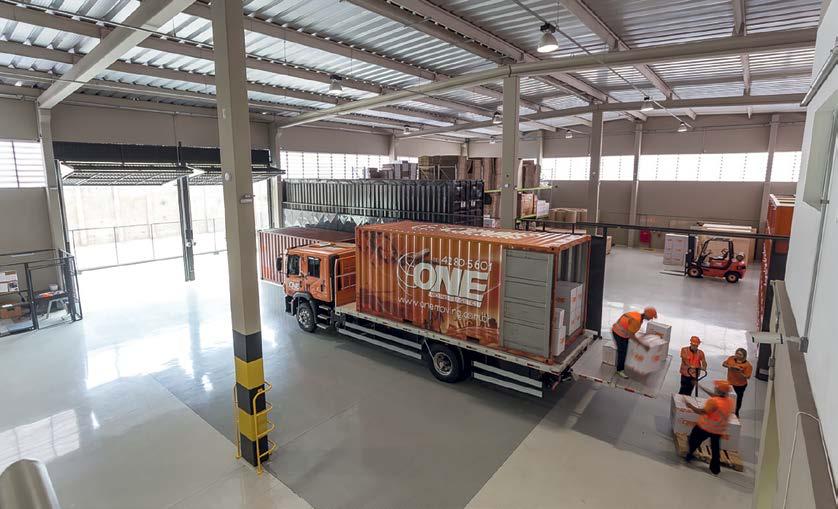
partners and providing all the information needed to promote Notabrownbox to corporate clients, private customers, and internal customers, Gosselin is also approaching industry associations to get behind the initiative. Van der Rhee – who expects to spend more time overseeing the project as it grows – says, with sustainability now a key aspect of FAIM, she would like to see using Notabrownboxes introduced as a pass criterion of the future.
‘It won’t be long before moving companies don’t have a choice: we must all evaluate our supply chains, business and materials to reduce our negatives and become more sustainable,’ she says.
Classic Moving and One Moving are both working with key corporate partners on reuse schemes.
Classic Moving’s Brian Milligan says: ‘It was an opportunity for us to look at a more sustainable approach to packing materials, with the primary focus being the removal of plastics and reusable material options. Materials are such a fundamental element of international moving, so it’s a crucial consideration in our sustainability journey.’
One Moving’s Wesley Thomé agrees that reusing boxes plays a central role in the moving industry committing to more eco-friendly practices. ‘As a premium mover, we sought to demonstrate that high-end service and environmental consciousness are not mutually exclusive,’ he says.
Having clients opt for changes rather than be forced has been important, too, he adds. ‘We always ask if the customer feels comfortable using used boxes or if they prefer new boxes.’
Thomé says ensuring that the reuse scheme actually did deliver a lower-carbon footprint was ‘paramount’ while seamless integration into existing operations, staff training and, ultimately, upholding – or even enhancing – clients’ move experiences was vital, too.
The One Moving team inspects boxes from its destination services into Brazil and from domestic removals, separating out unusable ones for recycling and thoroughly cleaning, sanitising, and repairing those suitable for reuse. ‘The scheme is a concerted effort between One Moving, our dedicated staff, and environment-focused community partners,’ says Thomé.
Milligan says customer reactions to Classic’s initiative have ranged ‘from very positive to mildly indifferent’, with those businesses that are already well into their own sustainability efforts ranking among the most supportive.
‘Others are more focused on whether these measures will compromise the protection of their goods,’ he says, adding that a pilot scheme with one of Classic’s European partners has demonstrated that these concerns have been addressed. Thomé agrees: ‘Ensuring that the durability and functionality of the boxes met our high standards for client possessions’ safety was crucial.’
Milligan says monitoring of Classic’s reuse delivery is ongoing. ‘When a shipment arrives with, or from, our key partners containing plastic alternative materials and non-branded “reusable” cartons, we will do a thorough check on how well non-plastic tape has held up during transit; how bulky furniture items have been packed when a cardboard alternative to PE foam and plastic craft blankets has been used; and how well the reusable cartons have held up during the moving process – and if they can be used again,’ he says. ‘We have regular communication with the partners to offer as much detail as we can on successes and areas for improvement.’
Thomé says that One Moving is measuring the sustainability of its reuse project with a mix of quantitative measures – including the number of reusable versus single-use moves, total reduction in cardboard waste, fuel usage/emissions data,

 Brian Milligan, Classic Moving
Brian Milligan, Classic Moving



and a regular cost-benefit analysis – with qualitative measures including feedback from moving crews.
Milligan is hopeful that reuse will gradually become more widespread throughout the industry – but it necessitates collaboration across partner networks.
‘A basic example would be a mover making an investment in reusable packaging,’ he says. ‘By the nature of our business, we send that packaging somewhere, so if we don’t receive a similar standard of materials inbound from our partner network, the full benefit is lost.
‘I would love for FIDI to set an initiative for its members on this, as our partner has done with its network, so collaboration is encouraged and we approach sustainability goals as an industry.’
Thomé, meanwhile, says One Moving sees sustainability ‘as a natural extension of our qualityoriented ethos’ and is working more closely with its partners to develop new sustainable initiatives in their market. ‘Not just the reuse of boxes, but also the reduction of plastics in our moves overall,’ he says.
For Milligan, there are several areas he believes should be the next targets for upping the industry’s packaging sustainability. ‘Every little counts,’ he says, ‘and if we looked at 100 per cent recycled pulp for our materials, eradicated plastic, while looking to our industry leaders and member associations to promote awareness, we could make a significant positive environmental impact.’
Sydney-based Nuss Relocations began shifting its approach to packaging materials more than 30 years ago, when it began recycling cartons to cut down waste.
The company’s Ray Beard says, at that time,
quantifying the impact of such a move ‘wasn’t so important, but doing something about wastage and unnecessary landfill was’. While used cartons could, in theory, be recycled, dealing with plastic tape still attached to many has proved expensive, so reuse became a more attractive option.
Nuss collects used cartons from customers, removes the plastic debris, and sorts according to size, type, and quality. ‘There was a time when we provided this service for free,’ says Beard, ‘but these days we charge a small collection fee to cover the increased time and effort – most customers are prepared to pay for that.’
The majority are also happy with used boxes, and to receive a quote based solely on these, he says. ‘This is a great turnaround in attitude.’ The result is a ‘substantial’ amount of waste being diverted from landfill.
The project is gaining its own momentum, too. ‘Now we use paper tape, not plastics, when we are retrieving and reusing our own cartons; there is less work involved in removing it,’ says Beard. ‘We have taken the decision to move away from plastic products totally. We have phased out plastic tape and are phasing out bubble-wrap products, replacing these with paper tape and paper-layered wrapping.’
Although the latter has to be imported into Australia, Beard says the net carbon footprint is still ‘far more’ sustainable than bubble wrap. With most bubble wrap previously used for exporting, the alternative materials make their way overseas, he adds.
‘We will continue to seek new products that further improve our eco-impact and sustainability ratings,’ says Beard. ‘In November last year, we achieved an Ecovadis Gold rating, and our ambition is to make that platinum.’

Reusing resources will be central to making sure current and future businesses are economically and environmentally sustainable. But moving companies must have a clear, collaborative strategy, and act fast to succeed, says Paul Barnes from Inspire Mobility Consulting

Reuse is of extreme importance to any moving company that wants to be a viable long-term business. Anyone who doesn’t understand that this is a pivotal moment and just the start of a positive systemic change has their head in the sand.
Moving companies need to move at speed to reduce the extreme levels of single-use materials and waste if they want to remain in business.
Collaboration and a clear strategy that includes considering the needs of affected stakeholders and potential barriers to progress are essential steps. To move at speed in an effective manner we need knowledge resources that can help shape our strategy and develop multiple reuse concepts into reality.
Circularity, or the circular economy, is a valuable and insightful concept for the moving industry. It challenges the conventional linear model of take-make-use-dispose to which we are accustomed, and proposes a regenerative approach based on three principles of design:
1. Eliminate waste and pollution
2. Circulate products, materials (at their highest value)
3. Regenerate nature.
Circularity is not a new idea, and it often benefits us in ways that we may not realise, as many producers of goods have adopted circular practices in their business models.
It is a core element of the EU Green Deal, which supports circular processes in the economy, aims for better product design, promotes sustainable consumption, and seeks to avoid waste and keep materials at their highest value for as long as possible.
Circularity emphasises the importance of the
design phase and the creation of value for stakeholders. To illustrate this point, let us examine some of the high-level stakeholders involved in the production and use of a reusable packing box. We should also analyse the stakeholders, their interrelations, potential challenges, and actions that need to be considered to ensure value is created for all. For example:
Moving company: Shares information with the manufacturer (continuous learning loop) on when and how the box breaks, so it can be improved. Also, identifies areas that do not break, so opportunities to reduce the amount of material used in the production are explored.
Manufacturer: Shares information with moving company (continuous learning loop) on redesigned, improved box, cost implications (increased or decreased), and new ideas to improve performance, reduce costs, and so on.
Packing crew: Need to spend extra time to cut or remove the packing tape so they can flatten and store the boxes in the truck and warehouse. Also, handle the boxes with care to preserve their quality (highest value).
Global mobility programme owner: Considers how the relocating employee will react when the crew arrive with used boxes (or other materials). Programme owners must communicate proactively with employees about the benefits of using reused materials and the value they bring to them, the company, and wider society.
This is a simple, high-level overview, but hopefully it helps us understand the significance of circularity, the value it can generate, and the potential it has to inspire new solutions that demonstrate how sustainable household goods moving can be.


“For our freedom and yours”
Embracing our shared values of freedom, Poland stands as a pivotal bridge between East and West.
As a committed member of the EU, NATO, and the Council of Europe, its strategic significance is unparalleled.
Since 1992, Move One Poland has facilitated business expansion into Poland and beyond."
FIDI-FAIM CERTIFIED LOCATIONS: BUDAPEST AND DUBAI



As FIDI launches a much-needed carbon measurement tool for Affiliates, Sustainability and Strategic Communications Manager Magali Horbert shares her thoughts on how best to collate and measure our carbon footprint

Sustainability reporting for RFPs and the wider business are increasing fast, with new legislation formalising these requirements.
To make this more straightforward for our membership – and as we reported in the last issue of FIDI
Focus – FIDI is launching a carbon calculator that allows companies to input and crunch transport, travel, office, energy, and other data, to give measurable (and comparable) carbon-usage figures.
As we do this, I thought I’d share some of the most important learnings that have come from working on developing FIDI’s sustainability tools for our Affiliates.
l Carbon accounting is not an exact science. I am not questioning the science of measuring the amount of greenhouse gases (GHGs) in the atmosphere, which is an established science. However, attributing these emissions to specific commercial activities across complex supply chains is another thing, and no industry has this figured out completely – transportation and logistics included.
l If you get hung up on the exact numbers, you will lose track of the main purpose of the exercise, which is to define a baseline to understand and report on your company’s carbon footprint, and lower the impact based on the data.
l Requests from clients and legislators to report on your sustainability efforts are set to increase – and are becoming more detailed and data-centred. You will be asked for your
carbon footprint report soon, if you haven’t been asked already!
l There is currently no coordinated approach to carbon measurement and reporting in international relocation. Suppliers are being asked to report in different ways and with very little guidance, putting immense pressure on them. The reason for this is that, mostly, even clients/bookers don’t understand what is being asked from them.
FIDI’s
approach to supporting its members (and the wider industry) in this area
Why has FIDI decided to develop a bespoke carbon calculator for relocation businesses? There are two main reasons.
First, understanding what goes into carbon calculation is complicated – but we are all facing exactly the same challenge. If each company has to source and pay for its own consultant to solve this for them, it would be very expensive for everybody.
Second, there are many solutions available: if every company chooses a different solution, we can’t compare data across the industry, making the actual calculations useless (and still expensive!)
The FIDI x Worldfavor calculator will allow:
l A free-of-charge facility for relocation companies to calculate the carbon emissions linked to their main activities
l An industry-wide, coordinated, and transparent approach to
CO2 calculations, making data comparable between companies and regions
l Industry-wide insights, allowing for data-drive decisions to be taken by all stakeholders across the value chain.
It is important to remember that the calculator will only be as good as the data you feed into it. Collecting and inputting the data is still the responsibility of the company.
Reporting on sustainability efforts and replying to sustainability questions in RFPs is a time-consuming and complicated exercise.
The FIDI x Worldfavor calculator only helps with the actual carbon footprint calculation of your Scope 1, 2 and 3 emissions; you will still need to: collect the data to put into the calculator; use the results to populate your sustainability report and your RFP submissions; and act on the results to lower your impact.
The actual data-collection process is fundamental, as you will need the most accurate and detailed data you can get to ensure the best possible results. You will also need to show consistency in your data collection, so getting it right from the beginning will avoid future headaches.
We strongly recommend that you take time at the beginning to structure your approach in such a way as to make future collection easy and reliable. Putting one person in your company in charge of this process will ensure accountability and proper follow-up.

If you are just starting to collect your carbon data, you will find templates for the main groups of activities in the FIDI x Worldfavor calculation platform. These will help you to structure your data collection.
What data are we talking about?
Here are some of the main data sets that you will need to collect before calculating your company’s carbon footprint:
1. Transportation of goods (whether household goods or other):
l Transportation of goods via road: whether you transport goods using your own trucks or through a supplier, you will need the following data for each move:
l If available: type of truck (diesel or petrol; articulated or rigid; weight-range of truck)
l If available: proportion of load: is the truck closer to empty (0%), half-full (50%) or full (100%)?
l Distance travelled
l Transportation of goods via sea, air or train:
l For sea: type of ship (cargo ship, bulk transporter, vehicle)
l For air: short-haul (less than 3,700km) or long-haul (more than 3,700km) flight
l Weight (for sea shipments, use VGM as it appears on the
Bill of Lading)
l Distance
2. DSP
l The total distance travelled by your agents by car (companyowned vehicles or not; with difference between size of cars and what fuel is used) for different destination services, such as look-see visits, house and school search, settling-in, etc.
3. Electricity and other energy sources
l Your annual electricity consumption, in kWh (you can find this information on your utility bills)
l If you use natural gas, your annual gas consumption in m³.
4. Business travel
l The total distance flown by your company’s staff, divided into:
l Short-haul and long-haul (international) flights
l Passenger class (economy, business or first-class)
l The total distance travelled by train, car or bus
l The number of hotel nights, by country
5. Employee commuting
l The total distance travelled by car (with difference between size
of cars and what fuel is used)
l The total distance travelled by public transportation
What data is not currently included in the calculator?
l Emissions linked to packaging material: this will be included in a next phase of the tool, planned before end of this year. In the meantime, we will ask you to provide total weight of different types of packaging material used over the past year.
l IT services and assets such as cloud storage, laptops and desktops: it is difficult to provide globally applicable emission factors to calculate this on a global scale, so we have decided to exclude this from the calculator for now.
Collecting data might seem overwhelming. We understand this, but the carbon calculator will give you an invaluable framework to help with the task. We suggest you simply get started. Take it step by step and use the best available data you can get hold of now. Start somewhere – and it will get easier.
l For more information about the FIDI x Worldfavor calculator, contact Magali Horbert at sustainability@fidi.org
“Understanding what goes into carbon calculation is complicated –but we are all facing exactly the same challenge”



FIDI has launched a marketing programme for those businesses that passed the FAIM audit with flying colours. FIDI Marketing Coordinator Shola Gallard looks at what it takes to become one of these ‘Top Performers’ and how FIDI is rewarding this select group with bonus marketing tools and services.
The FIDI FAIM audit is famously tough: every Affiliate who passes it can lay authentic claim to being part of an exclusive group made up of the very best movers in the world. Did you know, however, that within this elite there is a further, smaller group of companies that have earned the right to be called a FIDI ‘Top Performer’? So, how is this accolade achieved?
The FAIM audit uses Non-Compliant Values (NCVs) to measure success; the current FAIM 2022 Standard lists 1,475 NCVs that could go against a business. Any company that gets through the audit process with no NCVs against its name is designated a FIDI ‘Top Performer’.
To recognise these companies’ achievement, FIDI is publicising their success on our Find a FIDI Affiliate page – the website’s most-visited page, with more than 10,000 hits every month. It is also offering free services to this group, including customised FAIM videos and leaflets for presentations to corporate and private customers, and a Top Performer logo for their exclusive use.
At Globe Moving India, already a member of this elite group, Director Ajit Venkatesh R says preparation was essential to the company achieving the status.
‘In preparation for our FAIM audit, we invested heavily in refining our processes and enhancing staff training, reinforcing our commitment to being a process-driven company,’ he says.
‘We believe that robust processes are fundamental to delivering high-quality services to our customers. To ensure adherence to FIDI-FAIM compliance, we implement internal audits and provide rewards to
To qualify as a FAIM 2022 Top Performer, a company must have:
l Scored 0 NCV on the audit day
l Submitted pre-audit documentation within the required timeframe
l Conducted annual internal FAIM audit (IFA) within the required timeframe.
our team members who consistently meet or exceed compliance standards.’
Seema John, International Moving Manager at another Top Performer, GAC Qatar, says the FAIM audit is a ‘comprehensive process’ of which every team member should be made aware.
‘We recommend initiating a preparation plan before the audit to cover all aspects thoroughly,’ she says, to ensure your company is always compliant with FAIM requirements.
‘As part of that strategy, we have set up a dedicated team, including one new member from our department. They guide us through the preparation period ahead of the audit, ensuring that every member of the department is familiar with the process and understands what needs to be done to meet requirements, and confirms all supporting documents are ready.’
Embedding audit requirements into your company’s day-to-day activities is crucial for creating awareness among staff, John adds, as is highlighting the importance of being ready.
‘With this in mind, GAC has aligned all its standard operating procedures with FIDI FAIM requirements,’ she says. ‘During the yearly internal audits conducted by our Health, Safety, Security and Environment (HSSE) team, we thoroughly assess our adherence to these processes, to ensure we seamlessly meet the requirements.’
John’s advice to fellow FIDI Affiliates is simple: ‘Be meticulous, prioritise preparation, and be thorough in your processes.’
Venkatesh elaborates: ‘I would advise the following. Start early to give yourself time to prepare and address potential areas of improvement. Also, pay attention to detail and read every word of the selfassessment checklist – some points may appear similar to those in previous audits, but often include additional important details.’
He adds that team engagement is vital – ‘ensure that every team member is familiar with the audit criteria; everyone’s understanding and participation are crucial’ – and conducting mock audits will help identify gaps and areas for improvement ahead of the actual event.
‘Remember, compliance should not be seen as a mere goal for the audit, but as an integral part of your company’s daily routine,’ says Venkatesh.

Rather than just a badge of honour, Venkatesh says becoming a Top Performer is ‘a direct reflection of our organisational mindset’ and ongoing motivation for the company to ‘strive for excellence’.
‘It reinforces our commitment to maintaining the highest standards, ensuring we are always evolving and improving,’ he adds. ‘This focus on excellence directly translates into better quality of service for our customers, ensuring their utmost satisfaction with every interaction.’
The use of an exclusive set of FIDI branding tools that comes with Top Performer status brings ‘significant marketing and business advantages’, according to Venkatesh. ‘This prestigious recognition enables us to distinctly differentiate ourselves in our communications with corporates, RMCs, and moving partners around the world. It serves as a compelling statement that sets us apart from other movers, clearly highlighting why clients should choose us,’ he says.
Being a Top Performer also helps the company attract industry-leading talent, adds Venkatesh. ‘Professionals at the top of their field are naturally drawn to organisations recognised for their commitment to excellence and quality.’
John says GAC Qatar incorporates Top Performer branding extensively in its marketing materials. ‘This third-party recognition serves as a unique selling point in our pitches, playing a crucial role in customers’ decision-making, showcasing our commitment to them, and underlining the quality of our work,’ she says. ‘“Top Performer” status is a proven track record for our company.’
l Only companies that had their audits under the FAIM 2022 standard are eligible for the Top Performer programme, because the criteria are different from FAIM 3.1 and 3.2 standards.
If you want to set your sights on becoming a FIDI Top Performer, look out for webinars and workshops that FIDI has developed to help you prepare for FAIM audits – and conduct your internal FAIM audits early.

As the FIDI 39 Club prepares to host its conference in Edinburgh, President Jackie Stouffer describes how the organisation has evolved far beyond its annual event to provide development and networking opportunities for its membership throughout the year
It’s conference season – a time of year to which we all look forward. But wait a sec –‘all’? It’s not actually all of us, is it? A very small percentage of our industry is fortunate enough to attend the in-person events our sector has to offer – the annual FIDI conference being just one example.
For so long, FIDI 39 Club membership was inextricably tied to conference attendance. Popular opinion among decision-makers was that the only benefits offered by the club were during the annual conference, and that the FIDI 39 Club equals partying. Therefore, registering someone for the club meant the individual would be presumed to be going to the annual conference to party. The solution to this? Avoid registering your young talent for the club, so as not to set the wrong expectation.
I am fortunate that my boss did not subscribe to this line of thinking in 2014, when I joined the FIDI 39 Club. I joined early, and got involved. My life would be very different if I had not joined –professionally and personally. The club has changed my life for the better, and in more ways than one.
we ensure previous perceptions do not return, and cement the idea that the expectation of membership is now (and forever) focused on helping our members learn and grow for their future careers?
With this in mind, the club will be rolling out two membership categories: one dedicated to virtual members, opening what we hope to be a permanent gateway for staff at all levels of a company to join and benefit from club membership; and one for members who attend the annual conference.
With this delineation there can be no misconception of membership expectations. The message is clear: the club is here to help FIDI’s Affiliates attract and retain talent, and, ultimately, offer pathways to future leadership in our industry.
I am sure there will be some growing pains with this shift in structure and mindset, but growing pains mean progress, and progress benefits us all.
“The club’s mission has been to remove the barriers to membership that it has historically faced – and I think we are just about there”
In the past few years, its mission has been to remove the barriers to membership that it has historically faced – and I think we are just about there, pending a few final milestones to pass.
We’ve made notable progress, shifting the membership focus away from the annual conference towards an increasingly virtual presence. We give our members the chance to connect regularly throughout the year through a variety of channels, while developing their skills, such as public speaking and professional writing. We’ve launched programmes to engage our members year-round, including our Scholarship and Mentorship initiatives (read more about these in the following FIDI 39 Club article).
The final hurdle is the membership itself. How do

While growth is important, sustainable growth is absolutely vital. Making our membership more accessible does not mean much if we do not have a model in place to continue to engage and benefit our members for years to come. So the club is launching its own sponsorship packages centred on its key functional areas. These will allow it to continue to provide key programmes for its members, while adding offerings to its toolbox and yearly calendar.
Being a member of the FIDI 39 Club today is markedly different from 10 or even five years ago. This can be attributed to several factors, but it comes down to people: the people involved in the club, and those who believe in its value and who are willing to sign up their staff.
To the readers who have already enrolled staff –whether repeat club supporters or those engaging staff for the very first time – thank you for your confidence in what it has evolved into over the years and what it still has the potential to be.
To the FIDI Affiliates reading this who are debating whether to register your employees, I am here to tell you that this industry is attracting and retaining some pretty amazing talent. I see it at our FIDI 39 Club events, and it is our collective responsibility to make sure we keep our talent engaged and genuinely interested in our industry.
We are committed to this cause, and will continue to demonstrate that the FIDI 39 Club, and all the members it serves, are so very much more than an annual conference.

Australia’s largest branch network, offering complete moving and mobility coverage from coast to coast since 1911. Australia. Think Grace.

grace.com.au/partners

Established with the planting of a tree at the 1991 Conference, FIDI’s 39 Club has grown in strength and stature over the past three decades. FIDI 39 Club board member Sonja Tuomela looks at how the organisation is planning to keep itself evolving and relevant into the future – and gives the lowdown on its exciting FIDI Conference programme

As the FIDI 39 Club board, we have developed a clear strategy for what we want to see our club become and how we will support our young professionals into the future.
We are dedicated to giving our members the tools and resilience they need to drive the moving and mobility industry forward. This includes overcoming generational hierarchies and becoming consistent challengers of our industry.
The FIDI 39 Club also helps members connect. We facilitate collaboration, and help members build trust and friendships that overarch any distance and last for a lifetime.
The FIDI 39 Club 2025 strategy is built on three pillars:
1. Build a sustainable FIDI 39 Club
2. Increase member engagement
3. Grow our tool box.
The first pillar requires us to look at different aspects of sustainability, including economic, corporate, and environmental. From the economic point of view, we are looking to launch our own sponsorship opportunities that allow Affiliates to invest in the next generation of

leaders. For the corporate aspect, we are creating new programmes to encourage FIDI 39 Club members to get involved in activities and share their experiences.
In addition to building a sustainable club that will be passed seamlessly from one generation to the next, we have launched environment-focused initiatives. As we are all aware, air travel has a huge carbon footprint –but conferences are a crucial part of our industry and travel is often unavoidable.
We believe every decision counts, no matter how small: which is why we have launched FIDI 39 Club’s Green Travel Initiative for the 2024 FIDI Conference in Edinburgh. We are encouraging everyone coming to the conference to make their travel sustainable in some shape or form.
This might incorporate train travel from London or from other parts of Europe, such as Brusselsas our FIDI office staff have committed to do, as a great example to us all. If this is not an option, we encourage you to choose a form of public transport from the airport to the hotel, instead of taking a private taxi.
A carrot usually works better than a stick when it comes to getting outside your comfort zone. For this reason, everyone who takes any form of public transport to the conference can provide the proof by email to 39club@fidi.org to be entered into a raffle to win a fantastic prize: free registration to the 2025 FIDI Conference in Dubrovnik, sponsored by the FIDI 39 Club.
Challenge your colleagues to make their travel to the Conference more sustainable – and spread the word. Keep your eyes open for more details on FIDI 39 Club’s Facebook and Instagram feeds.
FIDI 39 Club’s tradition of hosting an informal dinner during the Conference has gained traction and it has now become part of the programme for the FIDI Conference. In the spirit of sustainability, the club has chosen a restaurant based on its ability to provide low-carbon meal options – removing high-carbon options all together.
To give you an example of emissions, a flight from Edinburgh to London has a carbon footprint equivalent to the production of 32 Scottish beef burgers. In light of this, I hope guests will be happy to replace one
meat-based meal with a low-carbon option. We plan to continue this low-carbon approach to dining at the FIDI 39 Club informal dinner in future.
The FIDI 39 Club wants to ensure promotion and continuity of our association through the understanding of our industry and its scope of action. This is the reason behind the imminent launch of a new Ambassador Programme this year.
Part of our continuity mission is the establishment of members who understand the relevance of the FIDI 39 Club, and its role in the FIDI community. We want to appoint Ambassadors who can promote members to secure the programmes and initiatives that the Club has in place, and create a future space for new ideas and initiatives. They will be young professionals who, through time and preparation, will build leadership skills to ensure that the Club’s activities are workable and effective.
For the Ambassador position, we are looking for employees of FIDI Affiliate companies who are either already part of the FIDI 39 Club or are willing to join. We are looking for qualities including proactiveness and enthusiasm about our industry, and our FIDI 39 Club initiatives. Leadership potential, adaptability and professionalism are additional qualities that will make someone particularly well suited to this position.
The Ambassador programme will give great opportunities for participants to learn more about FIDI and the FIDI 39 Club, and what happens behind the scenes. It has been created with the aim of helping our members become more comfortable with applying for and taking on leadership roles.
The FIDI 39 Club hosted an open-house session for the first time at the Bangkok Conference, which was a great success. Following the positive feedback, we have decided to host this session again in Edinburgh –giving existing and potential members, and company decision-makers, a chance to find out more about the club with a relaxed question and answer format.
During the session you will be welcome to voice your ideas for future club activities and give feedback on any of our activities or initiatives to date. To hear more about what the FIDI 39 Club has to offer, join us at this session – open to all Affiliates – on Monday 13 May, during the Edinburgh Conference.
The Conference is not far away, so let’s not forget the club’s core events, too. Traditionally, we have hosted a locally relevant sporting event as part of the FIDI 39 Club’s Conference on Saturday afternoon. This year, however, we are doing something different: hosting a traditional Scottish cèilidh (kay-lee), which is a social event with Gaelic folk music and traditional dances.
All Affiliates are invited to join us to enjoy socialising, a live Gaelic folk music band, and showing off their dance-floor skills. This event is open to all FIDI Conference delegates and includes a dinner buffet. Non FIDI-39 Club members may purchase a ticket when registering.
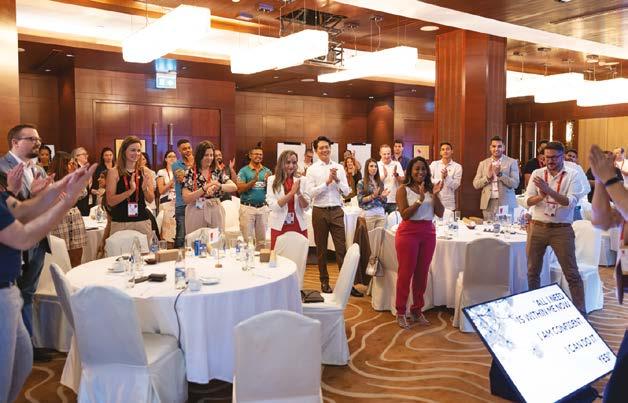
After the cèilidh we will continue to our conference highlight: the FIDI Party, hosted by the FIDI 39 Club. Based on the feedback from our Bangkok party, most people appreciated having the event alongside the locals, so we will be doing the same again in Edinburgh. Again, all Affiliates are welcome to come along, network, and get to know those who will shape FIDI’s future. Make sure to secure your ticket and arrive in Edinburgh on time for the most exciting party of the Conference!
As our past FIDI 39 Club President, Jessica Deutschmann, wisely stated: ‘We believe that in order to plan for our future we need to be aware of our past.’ To this end, we have launched a FIDI 39 Club Timeline on FIDINET (fidinet.fidi.org/fidi-39club/fidi-39-clubhistorical-timeline).
FIDI 39 Club’s roots stretch back to its foundation in 1991, when the first club President, Paul Wielens, planted a tree during the FIDI conference.
From here, the club has been the driving force behind many events, industry research projects, and insightful and progressive discussions with industry experts. Many of these have been collated into a new FIDI 39 Club toolbox, where you can find historical materials, presentations and other relevant information for club members.
This toolbox can be found on FIDINET. So far, it includes materials such as articles on ‘Marketing for moving companies’ and interviews about ‘Rising up in the family relocation business’. There is also a video recording of our educational session at the FIDI 2023 Conference in Bangkok, titled ‘Speak like a pro’, by keynote speaker Isabel Valle.
The FIDI 39 Club will add more relevant materials from our programmes into the toolbox, so be sure to keep an eye on it.
The FIDI 39 Club board is eagerly awaiting its members at the FIDI 39 Club Conference in May. Let’s make it another classic!
“Part of our continuity mission is the establishment of members who understand the relevance of the FIDI 39 Club”

When cargo is left in port by its owner, a mover can be saddled with a sizeable, and often costly, headache. Nick Kerr, Gosselin UK, Chair of the FIDI PCG Committee, introduces new professional cooperation guidelines advice on handling this issue – or preventing it up front
Abandoned goods are ‘those that are left behind in port without being cleared by the consignee’.
International movers are increasingly faced with household goods consignments that are abandoned by their owner at the port or freight terminal, and that remain there with no prospect of being customs cleared.
The reasons for this are varied, but if the owner goes missing – or refuses to engage with the customs clearance process and fails to accept responsibility for the consequences – the mover has the unwelcome burden of untangling the resulting mess, incurring fast-accruing and exorbitant carrier demurrage and port storage charges. It is almost always impossible for the mover to simply walk away.
FIDI receives regular calls from Affiliates asking for advice on how to tackle abandoned cargo. Those of you who have experienced a shipment consigned to your care abandoned by the owner without prior customs clearance will know there is never a simple answer.
FIDI’s Professional Cooperation Guidelines (PCG) Committee has responded to this growing problem with the addition of a new article in the guidelines, entitled ‘Abandoned Cargo’. Sadly, FIDI can’t provide Affiliates with an absolute process or certainty of a successful outcome, but it does attempt to give guidance on what to do and the important considerations, such as:
l Who is liable for abandoned goods?
l What should you consider when dealing with an abandoned consignment?
l What are the options for handling abandoned goods?
l What are the methods for disposing of abandoned goods?
The new article emphasises the importance of understanding the role of each party involved, and your legal relationship to them and with the owner of the goods. It explains the complications if your business is named on the carrier’s Bill of Lading, causing
you unintended liability for the carrier’s demurrage charges, yet unable to take delivery of the (uncleared) consignment, which would otherwise allow you to stop those accruing expenses.
You will need to consider your relationship with the transferee (owner of the goods). Do you have a direct contractual relationship with them – i.e. with no other vested parties? You might be the destination agent appointed by, and acting on the instructions of, a fellow mover (booker), who is, in fact, your principal and the vested party. Are you satisfied the booker, as your principal, retains accountability to the owner, or did this pass to you when you accepted the destination service instruction? This will depend on the contractual detail agreed between you and the booker.
Be cautious when accepting an ‘arrival only’ consignment if this necessitates your direct contractual relationship with the owner.
If you are named on the carrier’s Bill of Lading, whether as shipper or notify party, its terms will almost certainly create a liability for you as a vested party.
If you have contracted with the (absent) owner of the goods, those demurrage costs will fall to you.
If you have contracted with another vested party – for example, the booker or other client entity, such as a corporate customer or relocation management company – you should be able to pass on those demurrage costs.
Delay in acting is your enemy. Free time at the port is usually very short (typically five to seven days), and even less at airports, during which the destination mover must have arranged the clearance and release of the consignment to avoid demurrage, storage or other charges.
Be clear from the outset of accepting destination service instructions that you have – or with reasonable certainty will have – the necessary customs documentation, and have successfully contacted the owner to make a valid customs entry. If not, do your homework without delay; establish the potential costs of demurrage and port storage after free time, and tell
“Delay in acting is your enemy. Free time at the port is usually very short (typically five to seven days) and even less at airports”
your principal of those terms at the outset.
This is equally important even where a routine customs clearance process typically exceeds the port free period.
If you delay in advising demurrage and storage costs until expiry of the free period, with still no imminent prospect of customs clearing the consignment, you are unnecessarily contributing to the final demurrage cost.
If you are unable to clear the consignment, and arrest the accruing demurrage and storage costs, you may need to dispose of the consignment.
You will need to consider your contractual relationship with the owner, and local laws. Even if you are satisfied that you have a right of disposal, it may not be as simple as it sounds, and will largely depend on the customs authority process/ permission, which invariably differs across the world. If you can negotiate that, then the most common disposal solutions include:
l Auction
l Charitable donation
l Destruction

l Returning the shipment to its origin.
If auction is not possible, customs might permit the carrier or freight forwarder to destroy the goods, under customs supervision.
Exceptionally, you might be permitted to donate goods to a charitable cause. Return of the consignment to its place of origin might be possible under certain circumstances. It will need the cooperation of the agent in the origin country and a vested party prepared to take responsibility for the consignment and costs.
Sadly, abandonment of cargo is not always unintentional. There are some unscrupulous people out there who will change their mind after the shipment is despatched, deciding they no longer want the goods. They may try to rid themselves of usually low-value or worthless ‘junk’ when faced with unexpected additional shipping charges and refuse or abandon the consignment, leaving the mover with the bill and the consequences.
l For more information about the FIDI PCGs, visit the PCG section of FIDINet, or contact FIDI’s Business Intelligence Manager, MariePascale Frix at Marie-Pascale.Frix@fidi.org



As more movers diversify their basket of services, the FIDI Academy launched its first DSP programme with a seminar in Milan in November. Lydia Cope reports on the event
Our day job at the FIDI office isn’t providing relocation services, so attending Academy seminars allows us to really understand our member services and how we can better serve our Affiliates. Accordingly, I was thrilled to go to the inaugural
Some of the comments from those at the first DSP seminar
‘As a DSP consultant, it was extremely insightful to get an overview of the specifics of the key service offerings. I particularly liked listening to the offerings of each trainer – each key element was accompanied by a group task.’
‘I have to say I have never been a part of something so special and so tailored to my career. It was truly inspirational to be among the high-quality trainers and colleagues, and to hear their knowledge and experiences on the industry and sector.’
‘The home search/lease negotiation was
FIDI DSP seminar in Milan in late November 2023.
Attendees were greeted with blue skies and Italian hospitality at an upmarket hotel in the bustling Navigli waterside district, the base for the course. The opening evening brought together students
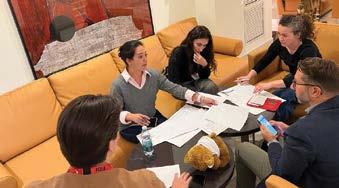
the best session. It was a real eye-opener.’
‘The transferee experience module was my favourite part. I liked hearing the customer’s perspective.’
‘The use of games and presentations was fun. We crammed in a lot – maybe four days would be better.’
‘It is easy to forget the impact you have on families, but the course really brought it home – this was a key highlight of the week and I’m sure for those starting the service a huge awakening to the empathy needed.’
100 per cent of attendees would recommend the DSP seminar to others in the industry.
and FIDI Academy trainers of all ages and backgrounds from around the world – from CEOs and owners branching out into relocation services, to DSP consultants who deliver such services day to day. Everyone was eager to learn, share and expand their DSP knowledge for the next three days of intensive FIDI training.
The seminar was expertly delivered by lead trainer Sara Lyrum Kronkjaer, along with her team of Andreas Eibel, Kim Ngoc and Robert Cormier, each bringing their own unique training style and personal experiences to the table. This sharing of wisdom and insights simply cannot be replicated through a textbook or online learning. The training content navigated the five core processes that the FIDI DSP module certifies: orientation, home search, school search, settling-in, and departure services.
The intensive sessions featured many interactive, hands-on tasks, giving us a chance to network and –as is customary for Academy seminars – to make lifelong connections and friendships.
Everyone also had an opportunity to build on their creative and presenting skills throughout the seminar, which offered them a chance to develop soft skills alongside the subject matter. We also heard first-hand from Maria Motteni, a transferee, on the mostly positive and sometimes negative impact a DSP consultant’s contribution can make during a relocation.
As a ‘trailing spouse’ with a growing family, Maria had moved across continents, facing language and cultural barriers, and the need to reinvent herself and make friends and a new career at each location. Her insights helped us students to understand the importance of delivering exceptional customer experience while managing expectations.
We also had a crash course on visas and immigration (V&I) from local expert Stefano Pacifico, from ECA Italy. He taught us a great deal about why it is important to brush up on local V&I rules and legislation, to make your transferees’ experience of relocating to a new country a smooth, even enjoyable, one.
After three days of intensive learning, and a rigorous exam, the seminar ended with a formal closing dinner, followed by a fun night at the local nightspots, where we celebrated completing the course by letting our hair down. Congratulations to

Corien Garcia, of Atlas International Movers, attended the FIDI Academy EiM seminar in Bangkok in November 2023 – and walked away with the Top Student title.
Atlas’s Managing Director, Jan Koets, said: ‘With eight years’ experience in the moving industry, Corien is a very experienced move coordinator. She joined Atlas in 2021 and is responsible for managing moves for some of our major corporate accounts and RMC business. Her experience, dedication to what she does and high focus on customer service make her a great asset to our team.’

everyone who took part, with special recognition for Katherine Brim, of Sterling Lexicon, who came out as top student – well done.
For anyone who is looking to set up DSP services or would like to learn from their peers, I would highly recommend that you sign up for 2024’s session. Please contact academy@fidi.org for further information.


As Brazil’s FINK Mobility turns 100, Dominic Weaver speaks to CEO Laura Ganon about the company’s journey and the changes it has faced during this time

Brazil’s FINK Mobility celebrates its 100th birthday this year. Founded in 1924, the firm began its journey by collating donations for victims of World War I and shipping them to Europe from Brazil. This was the starting point for the company to develop the global standing it has today.
In its early years, FINK focused on moving services for its local community. FINK Mobility CEO Laura Ganon says a commitment to excellence and customer satisfaction provided the foundation for expansion.
‘Over the decades,’ she adds, ‘FINK Mobility diversified its business areas to include fine art and trade-fair logistics, immigration and DSP, port operations, customs-bonded terminals, cultural events, and mega sports events logistics, such as the FIFA 2014 World Cup and the 2016 Olympic Games in Rio de Janeiro, as well as special complex projects, responding to the changing needs of the market.’
Ganon believes the firm’s longevity is the result of it adopting emerging technologies while putting people – customers, the FINK team and the community –first. ‘We have seamlessly integrated cutting-edge technologies into our operations,’ she says. ‘This forward-thinking approach has allowed us to stay ahead of the curve and offer innovative solutions.’
Dominic Weaver (DW): Tell us how you started in the moving industry.
Laura Ganon (LG): I joined the FINK Group on 19 December 1991.
It has been quite a journey – and I have enjoyed every day since.
It has also underpinned FINK’s national and international reach in mobility and logistics, and the achievement of some impressive figures: revenue of more than US$200m during the past calendar year, while customer satisfaction averaged 95.84 per cent.
The company first expanded beyond its traditional moving services and cargo transportation in 1985, when it launched immigration and DSP services. ‘The move expanded our market reach, but also mitigated risks associated with fluctuations in specific sectors,’ says Ganon. More recently, it has embarked on an initiative to reduce its emissions and overall carbon footprint, and boost environment-friendly practices and social responsibility in its operations.
As the company celebrates its 100th anniversary, Ganon says FINK has decided to donate the funds it would have spent on a party to ASM do Brazil – an organisation that teaches classical music and gives social and cultural education to young people in very poor communities – hiring their orchestra to play to mark the occasion.
Ganon says FINK Mobility continues to look to the future, drawing on its 100-year journey of evolution, innovation and adaptability to continue to navigate the moving industry with resilience and foresight.
DW: What has changed during that time?
LG: We didn’t use the word ‘mobility’ back then. I believe the main changes in the moving industry worldwide have been related to globalisation, which increased volumes – but, at the same time, changed who the decision-makers were.
A couple of decades ago, decisions were always made locally. If someone was moving from Brazil, the choice of which company to contract was taken in Brazil. But Brazilian companies started being acquired by foreign groups, and global contracts for removals began to be signed by multinational


headquarters; there was a shift of power within the industry.
More recently, RMC firms took on some of this control, shifting the balance of power again. Meanwhile, we started doing move management for moves in third countries, which – having been confined to moves either into or out of Brazil – opened up the whole world to us.
Today, following the pandemic, we are also seeing the rise of lump-sum moves, changing the market again, with more private clients being the bookers.
Change is a constant and, as with any business, we just need to stay vigilant and keep evolving to serve the market reality – while looking ahead to the likely future changes.
DW: How has technology changed packaging and transportation?
LG: Technology is playing a major role in how we move household goods around the globe. From virtual surveys to digital inventories, internet leads generators, and managing systems that replace humans in several tasks… so much tech-based change is occurring in the business. This is fantastic because it can save your team time, giving them more time for sales, improving service, and paying attention to customers’ needs.
DW: How have requirements for moving services evolved over the past 100 years?
LG: Customers are more sophisticated. They want immediate answers, and don’t want to talk to anybody, just see their information on a screen, preferably on a mobile phone. They are also very wellinformed. In the past, they just trusted
“Change is a constant and, as with any business, we just need to stay vigilant and keep evolving”
us, the specialists. Now they check all the information and demand much more from their service providers. I guess the only thing that has remained the same over these many years, and will never change, is that customers want the best quality for the most competitive price – this has always been a delicate and complex equation for us to solve.
DW: How have government regulations affected the moving market recently?
LG: In Brazil, we are facing constant changes in government regulations, which is costly for all companies. Government digitalisation has meant companies have had to comply with time-consuming new procedures – which are costly, too.
On the other hand, state company privatisations in the 1990s played a major role in Brazilian moving businesses because they caused a boom in volume and added to new demands for immigration and DSP services. This was a very positive trend for us.
DW: How have environmental concerns influenced the sector?
LG: It has caused a major change in how we operate. There is a huge drive for businesses to save energy, cut emissions, and measure what we are doing against specific targets – generally, ensuring we do as much as possible to care for the
environment. Sustainability has been one of the pillars for FINK’s mission and vision for the last quarter of a century, and has influenced our actions accordingly. Technology has now given us new tools, which can help us perform better and make our operations more environmentally friendly still. We have an Ecovadis award and a committee in charge of our sustainability development, which is certainly something customers are looking for in the companies they hire today.
DW: What sociocultural changes have affected customer demand and expectations?
LG: People accumulate less furniture, a large part of the population now reads on digital devices, rather than heavy books, and play music on the phone, meaning no records or CDs to move, not to mention videos with the rise of streaming channels. Photographs are no longer developed and arranged in paper albums, while furniture is now light, disassembled, and easy to transport.
Apart from that, it is much easier to buy things – mostly lower quality – so they are easy to dispose of, while there is good availability of furnished accommodation to rent. This well-established trend that we have been seeing for many years has had a negative impact on the moving industry. On the other hand, more companies are buying DSP services, and more ‘digital nomads’ are moving around, creating opportunities.
As with everything in life, you must acknowledge the changes and adapt. This is what FINK has been doing for the past 100 years, and the reason why, after all this time, we are still here.
Paul Baker, Managing Director of award-winning international loss adjusters and surveyors firm Baker & Co, looks at current strains and risks facing the international moving sector, and gives some easy-to-implement tactical advice for optimising your business strategy for a successful 2024

Let’s begin with a look at the state of insurance in international moving and what its role is in 2024.
Before we explore specific driving factors, let’s examine the overarching role of insurance in the context of international moving. It may seem obvious, but the importance of the responsiveness of an insurance company to cover the replacement of damaged or missing items declared in the event of accidental damage can’t be understated.
The team at Baker & Co has identified several forces influencing the global insurance market in 2024, with shifts in the political, economic, social, and technological (PEST) environment over the past decade. Premiums are noticeably on the rise.
Looking towards the client side of the sector, customers are always looking for ways of cutting costs. Increasingly, their search is for ‘all inclusive’ policies that include pairs and sets, mould and mildew, atmospheric/climatic conditions, selfassembly furniture cover and without policy excess or deductibles.
At the same time, cost-per-claims is on the rise as repair companies are not as easily available, are unable to source certain replacements, or lack the skill sets needed to repair modern furniture. Claims for chipboard and fibreboard furniture are climbing, but these materials are often unrepairable or not cost-effective to fix.
Rising prices of packing materials and pressure to adopt greener materials, and the assurance of ethical disposal, has added to overheads. Less packaging can also result in an increased probability of loss and/or damage.
More and more cities are implementing low-emission zones, meaning larger vehicles have restricted access to many destinations, driving movers to use costlier, smaller vehicles. With this comes an increased risk of damage because of extra handling.
Meanwhile, security has become more of an issue over the past few years with increased military volatility in Eastern Europe and the Middle East. There’s also the threat of pirate attacks across the Red Sea. These crises can result in more lengthy shipping routes and hikes in security requirements, pushing risks – and therefore insurance premiums – skywards.
All in all, we see an overall increase in claim volumes unfolding, putting substantial strain on both premiums and on the general claims management processes.
Giving the current state of play, what actions can moving company management take in 2024? And how do they find the most robust insurance policy?
“Insurers and moving companies are adapting to the increased cost of staff and agency workers as many transition to the emerging gig economy”
We are also seeing more mattress claims. If folded and moved incorrectly, mattresses can easily be damaged. They are costly to replace, so it’s always advisable to comply with manufacturers’ guidelines when moving these items. Opting for an excess or deductible on ‘claims made’ can eradicate time-consuming small claims, while allowing for more favourable premiums.
Insurers and moving companies are also adapting to the rising cost of staff and agency workers as many transition to the emerging gig economy.
Climate change is presenting an increasing challenge to organisations across the globe.
As with most areas of business, communication is key. Your choice of broker shouldn’t be taken lightly; and listening to the advice of a seasoned and proven professional company is key. Use a broker with a strong track record, not just in shipping but in air, road and rail freight. Having access to a comprehensive and well-maintained repair/restoration network will, of course, leverage your capabilities and greatly shorten the process.
Go for the widest cover available, and with as low a deductible as possible. In our experience, this option proves cost-saving in the long run.
To close, staying informed and proactive while adapting to the fast-evolving landscape is vital. By implementing strategic measures and collaborating with experienced professionals, companies can navigate the challenges of 2024 successfully.
l For more information, contact Baker & Co: www.bakerclaims.com

CFM Alliance – the group of companies that includes Classic Moving, DSP Relocations Asia, Classic Systems, and The Family Movers - has made a series of appointments to execute its plans for 2024 and beyond.
Kenneth Kwek joins the company as General Manager for its DSP Relocation arm. He has more than 20 years’ experience working in mobility for Cartus.
Jerry Teh joins Classic Moving as Business Development Manager, bringing experience with Crown, Santa Fe and AIMS mobility, in addition to almost 10 years developing business in international moving and relocation services.
Brian Milligan is promoted to Group Operations Director, overseeing operational processes across the CFM group of companies. He joined Classic in 2019 as Business Process Manager and was promoted to General Manager the following year, ‘raising the quality of Classic Moving operations to a whole new level’, according to Carl Häggström, CFM’s Group Managing Director.
Dan Mogg has been promoted to

General Manager of Classic Moving, having joined the company as Sales Manager in 2018, later becoming Regional Sales Manager. ‘It gives me great joy to announce his promotion,’ said Häggström. ‘Dan has done well over 3,000 surveys during his time at Classic Moving, and this has generated bookings worth more than $22m on outbound business alone.’
Meanwhile, the company has recruited Andre Vorshulte as Project Manager to oversee the implementation of new warehouse management software at Classic Systems, which provides high-end office furniture logistics, installations, and projects.
‘We believe in creating opportunities within the group of companies for people to grow in their role and develop their career,’ said Häggström. ‘We also believe in our strength as a group, where we can maximise efficiency, make use of synergy, and support each and every branch.’
In addition to these appointments, CFM is planning to recruit a Commercial Director later this year.





JK Moving Services has promoted Jackie Stouffer to Vice President of its international division, following the retirement of Phil Wells.
She has been with the company for eight years, in roles including managing major accounts and, for the past two years, the dayto-day operation of the international division in a director role.
Stouffer ‘has been instrumental in raising JK’s global industry profile, winning major contracts for JK Moving’, said a company
Arpin has appointed industry veteran Mark Burchell to front its global sales and business development.
A company release said: ‘Burchell’s extensive experience in the moving industry, particularly with international moving companies, positions him uniquely to drive Arpin International Group’s global sales strategies, reinforcing our commitment to providing top-tier moving services worldwide.’
Senior Vice President Stephen Crooks said: ‘I am thrilled to welcome an industry professional to Arpin International Group. Mark’s experience and success in global sales and marketing is impressive.’
Burchell, who holds the position of Vice Chair of WERC and Chair of FIDI’s FAIM Supervisory Committee (FSC), said: ‘I am very pleased to have joined Arpin at this exciting time. The whole company focuses on providing the best moving services and transferee experience available today.’
release. ‘During her tenure, she introduced industry best practices to the division and ESG [environmental, social and governance] programmes to the company. She is currently President of the FIDI 39 Club.
Stouffer, who graduated FIDI’s EiM and MiM as top student, reports directly to company President David Cox, who said: ‘Her leadership, creativity and understanding of our industry will ensure the continued success of this growing division.’

Drew Coolidge, former President and Chief Operating Officer at SIRVA, has taken on the same roles at Bridgeway, a major logistics and transport operator based in Pittsburgh, US.
He resigned from SIRVA in December, having worked for the company in Europe and the US since 2004. The unexpected move was announced by Chief Executive Officer Tom Oberdorf, who said: ‘I am extremely proud of the work that Drew and his global teams have achieved in support

of our agents, clients, shippers, and each other. Our success is evident in the strength of our moving brands and their continued momentum.’

Worldwide ERC (WERC) has appointed Anupam Singhal as its next CEO, following Lynn Shotwell’s resignation from the position last year.
Singhal had served as interim CEO since her departure and has been part of the WERC board for several years.
In an announcement made on 5 February, WERC said it had carried out an ‘exhaustive external search process’, led by Ashli Aldrich, WERC Chair, and Mark Burchell.
‘The entire board is excited about Anupam’s appointment based on his outstanding leadership qualities, integrity, experience, continuity, commitment, collaboration, engagement, and strategic vision,’ said Aldrich.
‘The board is emphasising continuity and stability in this leadership transition to ensure the unwavering pursuit of WERC’s strategic goals and mission.’

Alfa Mobility has appointed Andrew Cummins, pictured left, as Chief Operating Officer for its move business area, a promotion from his previous role as Director of Partners & Procurement.
Cummins now leads Alfa’s global partner relations, procurement and European planning departments, with strategic oversight of the quality of processes, operational methods, and supporting applications within move operations across Alfa’s global footprint.
The company has also appointed Mats Otterstedt as Managing Director for Sweden.
Previously, Annika Roupé held the positions of CEO of Alfa Mobility Group and MD in Alfa Mobility Sweden AB.
‘I am confident that his extensive experience and leadership qualities will be invaluable to our continued success,’ said Roupé.
Hasenkamp has opened a new office in Bratislava, Slovakia, as part of its strategic expansion in the relocation industry.
Led by Ladislav Urban, the new office will offer relocation and moving services for authorities, companies, and individuals in Eastern Europe. By expanding its activities, Hasenkamp says it intends to strengthen its presence in the region and enhance its existing network, which already includes Poland, Germany, the Benelux countries, Spain and the United Arab Emirates.
Move management business Interconex has appointed Alex Talbot as its new President, following the retirement of Chris Meyer in December 2023. Talbot has been with the company for 19 years, most recently as Executive Vice President,.
In his role as President, Talbot will front initiatives aimed at growing the company and build on the well-established relationships Interconex has built with its corporate clients and worldwide partners.
Nathan Corrigan has been appointed as President of Corrigan Moving Systems. He becomes the fourth generation of the Corrigan family to serve in the role and his predecessor, David Corrigan, takes on the position of CEO.

Supply chain tech provider Shipeezi has announced the appointment of Nikos Psaltopoulos as its Chief Operating Officer (COO). He was formerly the COO at MarineTraffic.
In his new role, Psaltopoulos will spearhead Shipeezi’s operational initiatives, leveraging his industry knowledge and technology background.
‘We are thrilled to welcome Nikos Psaltopoulos to the Shipeezi team,’ said Carlos Ferri, Founder/CEO of Shipeezi. ‘His expertise and strategic vision will play a pivotal role in steering Shipeezi towards new heights.
‘As we continue to innovate and develop cuttingedge solutions for our users, Niko’s leadership will be instrumental in achieving our ambitious goals.’
David W Graebel (Dave), Founder and Chairman of international global relocation management business Graebel, died on 29 November. He was 94.
A company statement said: ‘Dave founded the company with his father in 1950. Over the next 70 years, he nurtured, expanded, and strategically redefined it so that, today, Graebel is a leading worldwide global relocation management company with more than 1,000 employees and offices on three continents.
‘To understand and appreciate Dave’s story, it’s important to account for the impact of key advice he received from his mother at an early age: “You must let go of the rung below to reach for the rung above.” Dave executed that feat nearly flawlessly at the helm of Graebel.
‘We offer our deepest sympathies to Dave’s son, Bill, grandchildren, Jessica, Luke, Will, David and Dan, great-grandchildren, Lev and Radlee, and other members of his extended family.’
Mario Amato, of White & Company Ltd, said: ‘Back in 1987, when I joined Graebel, I didn’t know at the time that it would lead to some of the best years of my professional life. Having reported at different times first to Ben (Dave’s other son), then to Dave and, finally, to Bill, I could not imagine working for a more ethical and admirable family.
‘I spent 13 glorious years at Graebel, and as their President of the international division, I had the unique opportunity of reporting directly to Dave for a period of time that made an ever-lasting positive impact on my own life. I considered David Graebel as one of the most motivational and inspirational leaders of our time. To this day I refer to him, his family, and the Graebel company as the benchmark of world-class customer service.’
FIDI Secretary General Jesse van Sas said: ‘In the earlier days of my career in the moving industry, I attended my first FIDI Conference in London – 1999 I believe. I was working for Ziegler, but was not really advancing in my career because of another person heading the moving division.
‘Mario Amato introduced me to David Graebel, who kindly invited me to dinner that evening, along with my wife. And here I was, a young and rather insignificant sales guy from a mover in small Belgium, attending an intimate dinner with one of the big guys in the business. How privileged was I?
‘David gave me some solid advice that evening on how to advance my career, and what steps to take, while, at the same time, keeping the passion for the industry and the many perks in our line of business. It became one of those pivotal moments in my professional life, and I am still grateful for that today. We have lost one of the big guys in our industry, one who was an example to many.’
Bill Graebel said: ‘My father established some principles that have proved timeless. How he brought the company from one truck to a global relocation management company was simple: commitments made are commitments kept.’
In 2008, Dave received the Lifetime Achievement Award from the Moving and Storage Institute. At the ceremony, he said: ‘Forget about how many competitors you have out there. You don’t get any business from competitors. The only competitor you have to overcome is your
own inclination to quit, compromise or to tolerate.’
When asked what he was most proud of in his career, Dave said: ‘We started with that first truck, never doing it for the money, but for the trust. On a global basis, we’ve earned a reputation of trust and progressiveness. Now that’s not bad for a truck driver who got a couple of good loads.’
The company said: ‘In a 2010 speech, Dave described his mindset for success: “With the soul of a servant we can go out every day and say, ‘Hey World, what do you need?’” Throughout his life, Dave made a positive impression on everyone he met –whether it was a former US President, an NFL coach, a server at a local breakfast cafe, or a new Graebel employee. These people would walk away with the same impression, likely saying, “Wow, what a great guy. He just made my day!”’
Graebel’s full tribute to Dave is available at www.graebel.com/dave-graebel-tribute
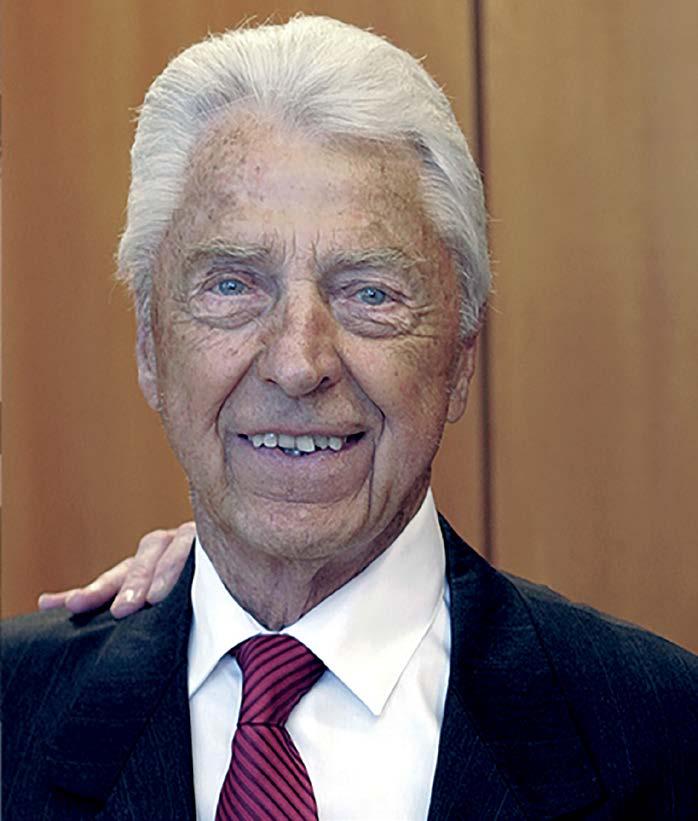
Director of Bremen-based Carl Hartmann and Chairman of the Overseas Shippers Association (OSA) Harm Meierdirks died on 30 December at the age of 56, having been diagnosed with two inoperable brain tumours.
He was an OSA board member for 26 years, involved in negotiating ocean freight rates on behalf of many in the international moving industry, and running the association.
Harm leaves his wife, Janine, and two sons, Jakob and Jannis.


Gethin Dalton, who was known to friends as ‘Longfellow’, died on 4 December 2023.
Born in Uxbridge, England, Gethin began his moving career as a packer, working his way up to become co-owner of Johannesburgbased FIDI Affiliate Nimwegen International between 1977 and 1987. He was elected chair of the South African Movers Association in 1983. In 1984, he was elected to the board of Eurovan International Movers and became chair of this association in 1985.
Gethin was involved in the merger of Eurovan and CETI to form the Overseas Moving Network in 1987, and was elected to its board.
He then moved to the US – where he later became a citizen –to work for Bowling Green Storage & Van Co in New York and joined AIRES in 1991 to open the company’s first regional office in Connecticut, where he worked until 1997.
His friend Nigel Saunders said: ‘I knew Gethin for more than 30 years. He was loyal to his friends, a writer and poet, with a great sense of humour. He combined his humour with his love for pranks.
‘His wife, Julie, died of cancer not long after they moved to the US and Gethin was a devoted single dad to his three young daughters. The fact that they all remained close until the end is testimony to the fine job that he was able to do.
‘Gethin was a great storyteller, who could be relied upon to fill whatever time was available to regale anyone with true stories, as well as his opinions on current affairs. His friends remember him for being caring, always considering others, and thinking of how to help, how to make things work out for others. He doted on his granddaughter, and was a good and kind man.
‘At work, his clients loved him; there was no detail too small for Gethin not to take account of and woe betide anyone who missed something! He loved to dress up in outlandish costumes and, with his gregarious personality, he could always get away with it, lovable and humorous as he was. The world is certainly a lesser (and quieter!) place without him.’
Peter Schaefers and Colin Gordon said: ‘Gethin was an extraordinary man, a great colleague, and a very good friend. He was a character who had so many friends around the world, who will all miss him.
‘Gethin had some ups and downs, but eventually found a very successful late-life career and stayed close to all his FIDI friends, and added many new friends in the industry. His loyalty to all of them included a large listing of all his friends’ birthdays and he never failed to contact them to share their celebration.
‘During his last few months, while he was in palliative care, all these friends maintained regular contact and personal visits to him and, even in that time, Gethin never lost his positive attitude and well-known sense of humour.
‘So long, Gethin, thanks for caring and for all the fond memories that we have of you. You were always a special friend.’
PM Relocations (PMR) launched a Christmas ‘Joy of Giving’ campaign, partnering with a number of NGOs in a variety of ways.
At Lakshyam Foundation, PMR’s volunteers transformed into secret Santas, giving winter essentials such as caps, socks, and muffins to children in New Delhi. It sponsored a talent showcase for kids at Dream Girl Foundation, which empowers and educates children in India, breaking gender-based barriers.
PMR volunteers also donated clothes and rations at The Earth Saviours Foundation, which provides a safe haven for more than 15,000 abandoned senior citizens, homeless disabled people, and deprived women.
PM Relocations says it has a year-round commitment to spreading joy and making
Toronto-based Brytor International has reached its 60th birthday, using the occasion to unveil ambitious expansion plans.
Following the successful recent opening of its Seattle branch, the company has now set its sights on new branches in San Francisco, Los Angeles, Fresno, and San Diego in California, as well as Portland in Oregon and Boise in Idaho, to get closer to its clients there. These US offices are branded as Formula Global Mobility.
‘From the majestic Pacific Northwest to the dynamic South, these new branches will connect the western United States, greatly
a lasting impact on the underprivileged. Its long engagement with NGOs reflects a dedication to motivating children to dream big and contribute to a more inclusive society, extending far beyond the festive season.

Argentine customised moving solutions provider Universal Cargo has celebrated its 40th birthday. The Buenos Aires–based mover was founded in January 1983 by Maritza Roselli and has remained independent and family-owned since then.
Roselli said: ‘Since the beginning, Universal Cargo has had to deal with the ups and downs in our country. However, we have been able to overcome the challenges – it has made us resilient. Our staff have been a key factor – and I am grateful and proud of each one of them.’

facilitating international moves, particularly towards Asia and Oceania, long-distance journeys, and cross-border moves with Canada and Mexico,’ said the company.
Spanish movers DLF International welcomed the champion team from the Disabled Winter Sports Center (CDIA) – a highperformance centre for recognising and training disabled winter sports athletes sponsored by the company.
‘Supporting the CDIA project was an easy decision to make, as we share values that we try to uphold in our daily lives –teamwork, perseverance, friendship, courage, competitiveness, and sportsmanship,’ said Juan Carlos de la Fuente, General Manager of DLF International Movers.
‘Each athlete has a story of overcoming
challenges, bringing us freshness, vitality, and the desire to be like them; they are true champions.’
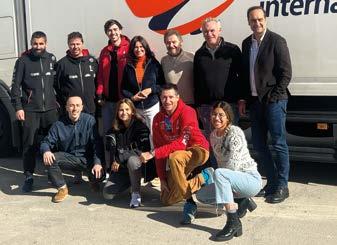

The team at Delight International took part in the Dubai Run, a highlight of the Dubai Fitness Challenge (DFC), at the end of last year. There was a great turnout by the staff, who ran the race in aid of the Delight Foundation, the company’s charitable cause.
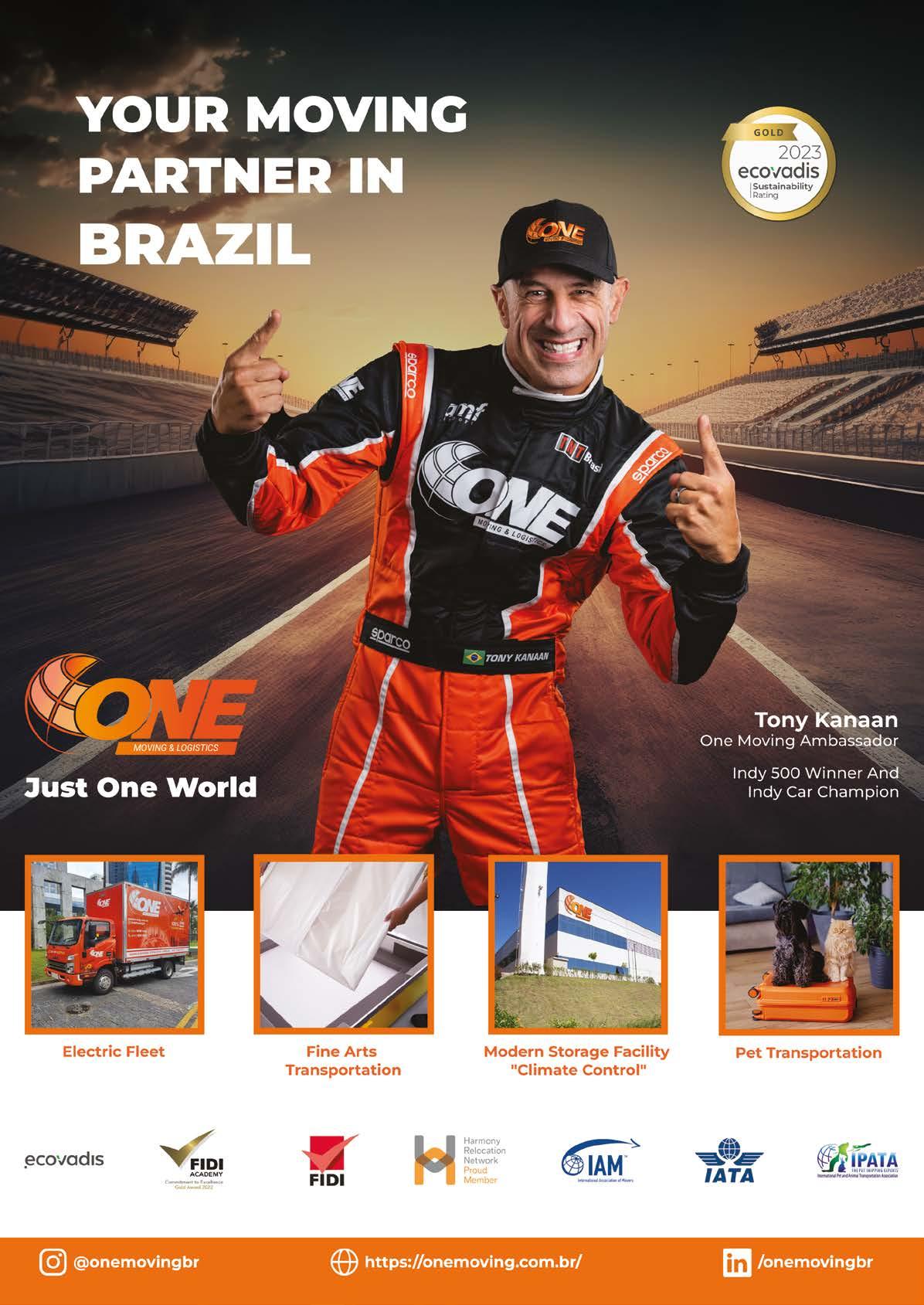

No two moves are alike. They are as unique as the people moving, each with their own reasons, destinations and unique personalities. People move for personal or professional reasons, but here at Gosselin, moving means more than just relocating people and their belongings.
We support you throughout the entire process, with care, confidence, and dedication. We cater to your needs and adapt to your world, down to the smallest details.
www.gosselin-moving.com